Tourism Industry Analysis: A Case Study
VerifiedAdded on 2020/01/15
|22
|7846
|86
AI Summary
This assignment analyzes the tourism industry through case studies of Africa and Sri Lanka. It uses data on tourist arrivals from various sources like reports and online publications to demonstrate the growth and potential of these regions in the global tourism market. The analysis covers the period from 1990 to 2015, highlighting key trends and providing insights into the economic impact of tourism.
Contribute Materials
Your contribution can guide someone’s learning journey. Share your
documents today.
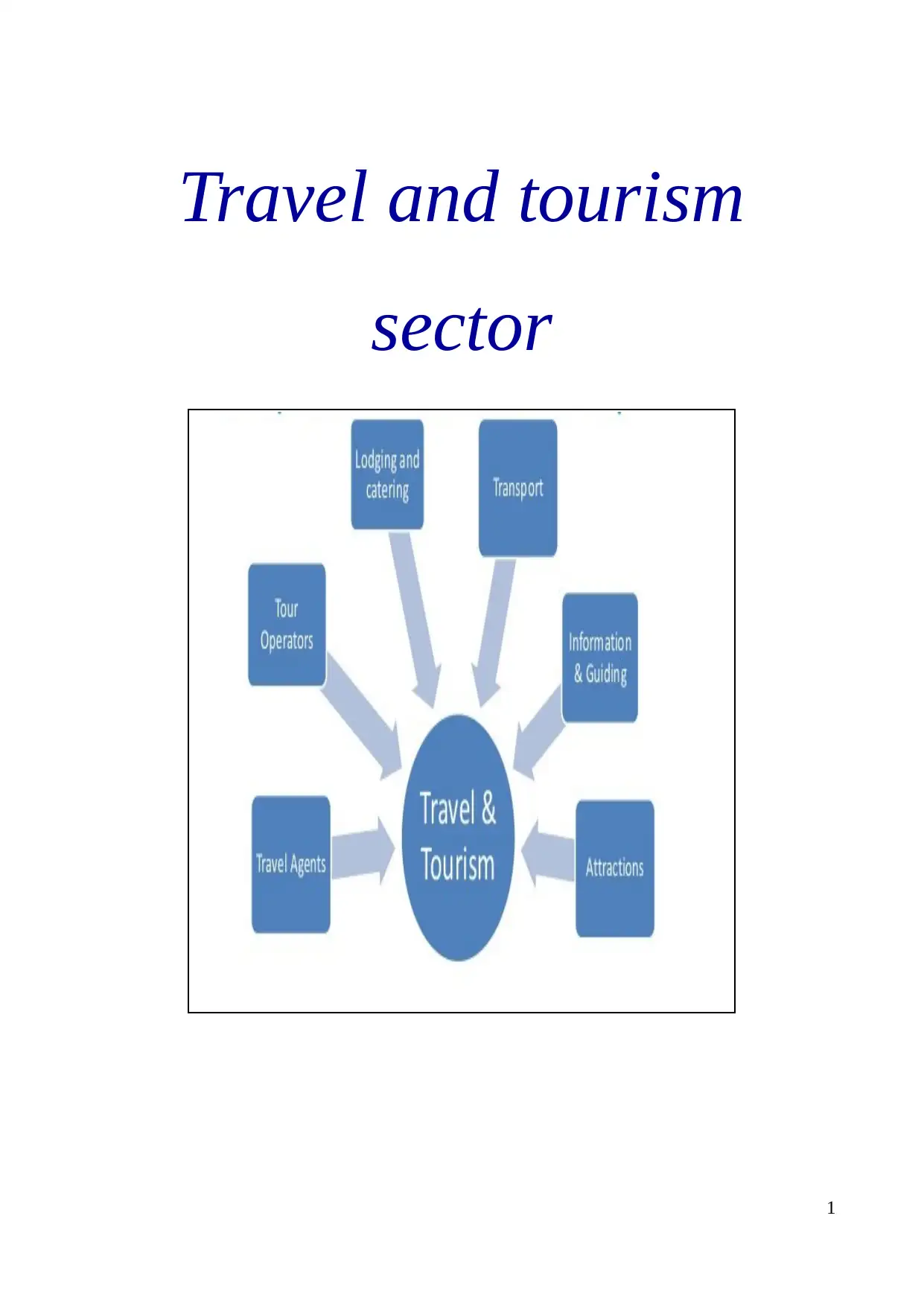
Travel and tourism
sector
1
sector
1
Secure Best Marks with AI Grader
Need help grading? Try our AI Grader for instant feedback on your assignments.
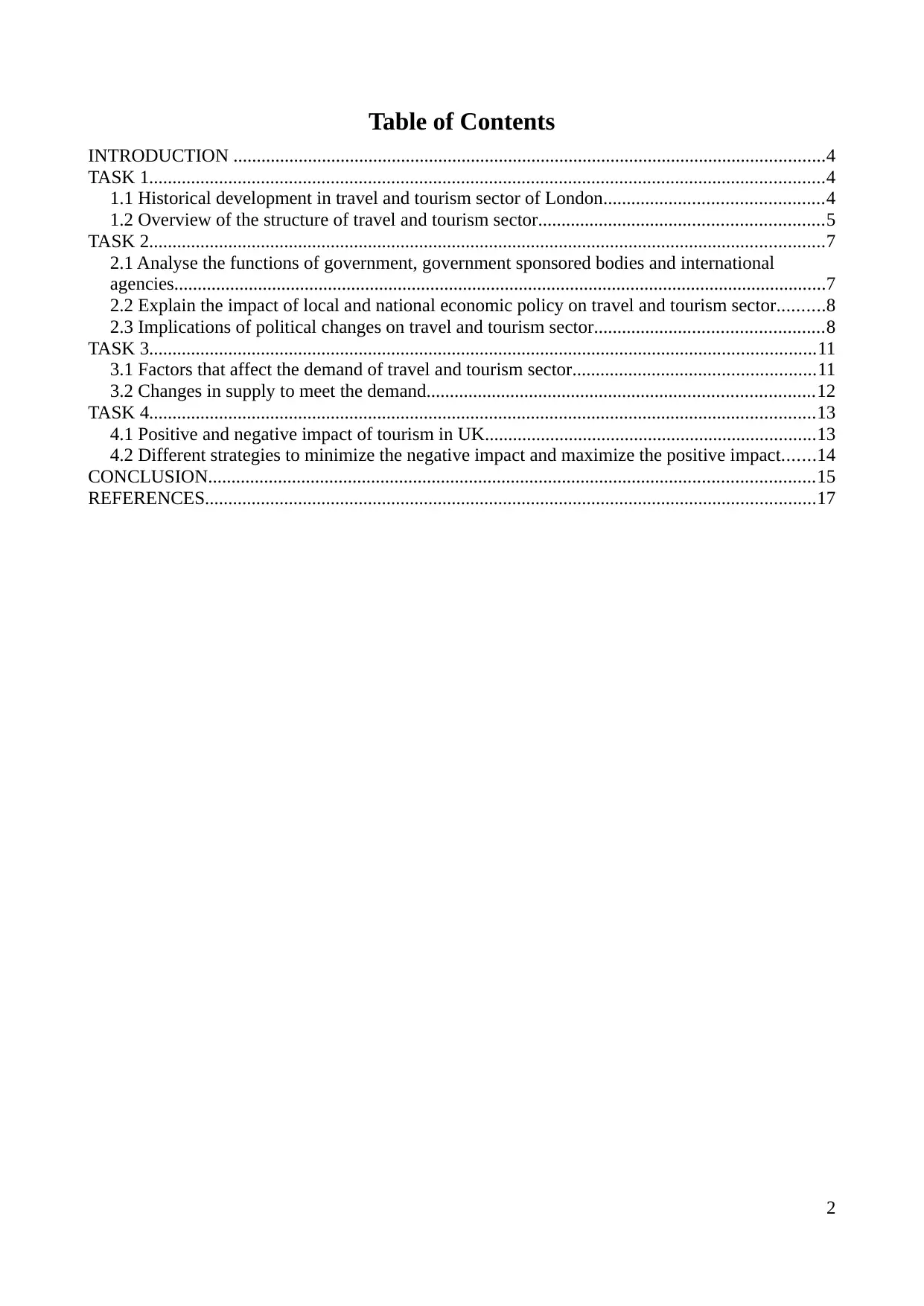
Table of Contents
INTRODUCTION ...............................................................................................................................4
TASK 1.................................................................................................................................................4
1.1 Historical development in travel and tourism sector of London...............................................4
1.2 Overview of the structure of travel and tourism sector.............................................................5
TASK 2.................................................................................................................................................7
2.1 Analyse the functions of government, government sponsored bodies and international
agencies............................................................................................................................................7
2.2 Explain the impact of local and national economic policy on travel and tourism sector..........8
2.3 Implications of political changes on travel and tourism sector.................................................8
TASK 3...............................................................................................................................................11
3.1 Factors that affect the demand of travel and tourism sector....................................................11
3.2 Changes in supply to meet the demand...................................................................................12
TASK 4...............................................................................................................................................13
4.1 Positive and negative impact of tourism in UK.......................................................................13
4.2 Different strategies to minimize the negative impact and maximize the positive impact.......14
CONCLUSION..................................................................................................................................15
REFERENCES...................................................................................................................................17
2
INTRODUCTION ...............................................................................................................................4
TASK 1.................................................................................................................................................4
1.1 Historical development in travel and tourism sector of London...............................................4
1.2 Overview of the structure of travel and tourism sector.............................................................5
TASK 2.................................................................................................................................................7
2.1 Analyse the functions of government, government sponsored bodies and international
agencies............................................................................................................................................7
2.2 Explain the impact of local and national economic policy on travel and tourism sector..........8
2.3 Implications of political changes on travel and tourism sector.................................................8
TASK 3...............................................................................................................................................11
3.1 Factors that affect the demand of travel and tourism sector....................................................11
3.2 Changes in supply to meet the demand...................................................................................12
TASK 4...............................................................................................................................................13
4.1 Positive and negative impact of tourism in UK.......................................................................13
4.2 Different strategies to minimize the negative impact and maximize the positive impact.......14
CONCLUSION..................................................................................................................................15
REFERENCES...................................................................................................................................17
2
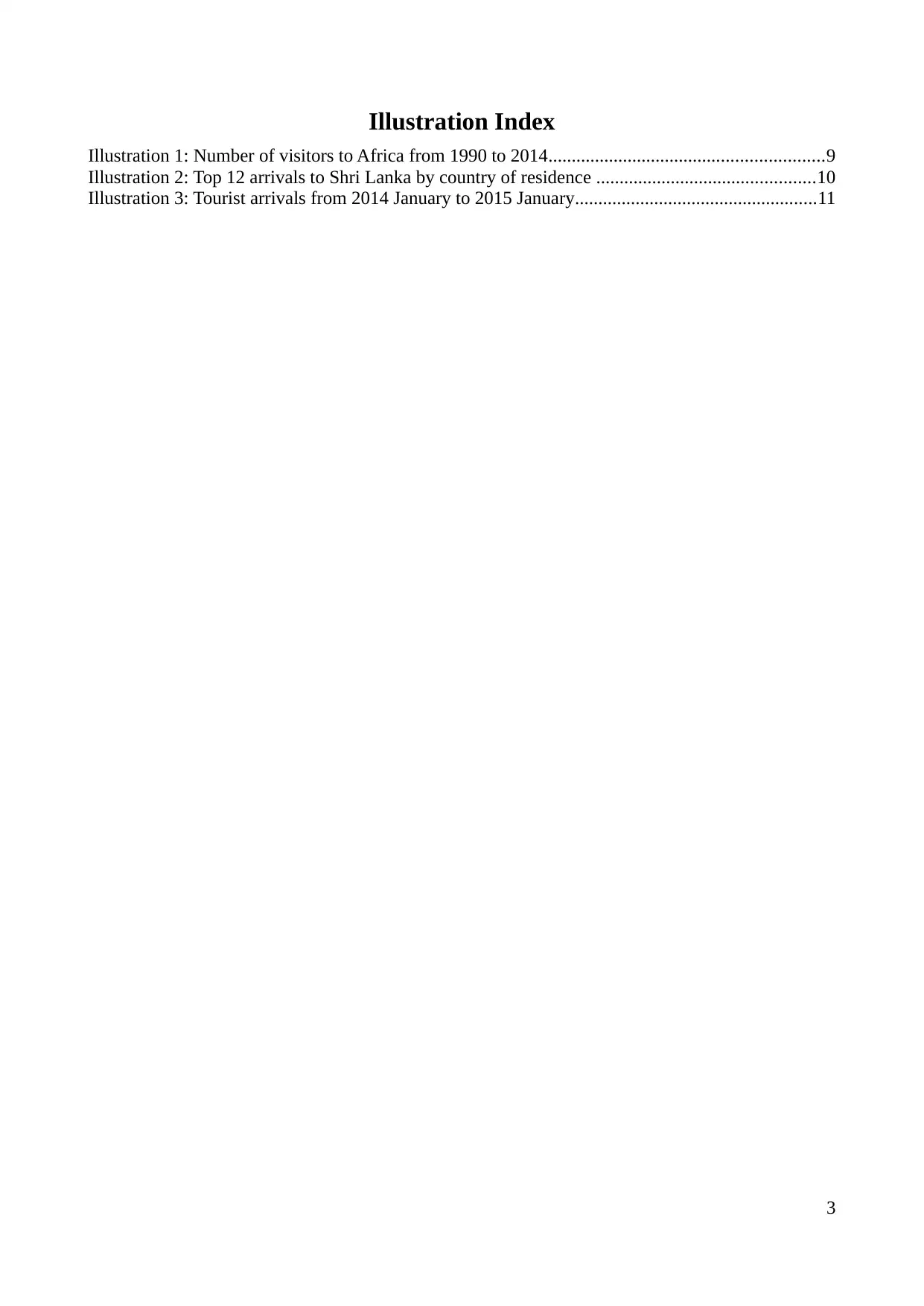
Illustration Index
Illustration 1: Number of visitors to Africa from 1990 to 2014...........................................................9
Illustration 2: Top 12 arrivals to Shri Lanka by country of residence ...............................................10
Illustration 3: Tourist arrivals from 2014 January to 2015 January....................................................11
3
Illustration 1: Number of visitors to Africa from 1990 to 2014...........................................................9
Illustration 2: Top 12 arrivals to Shri Lanka by country of residence ...............................................10
Illustration 3: Tourist arrivals from 2014 January to 2015 January....................................................11
3
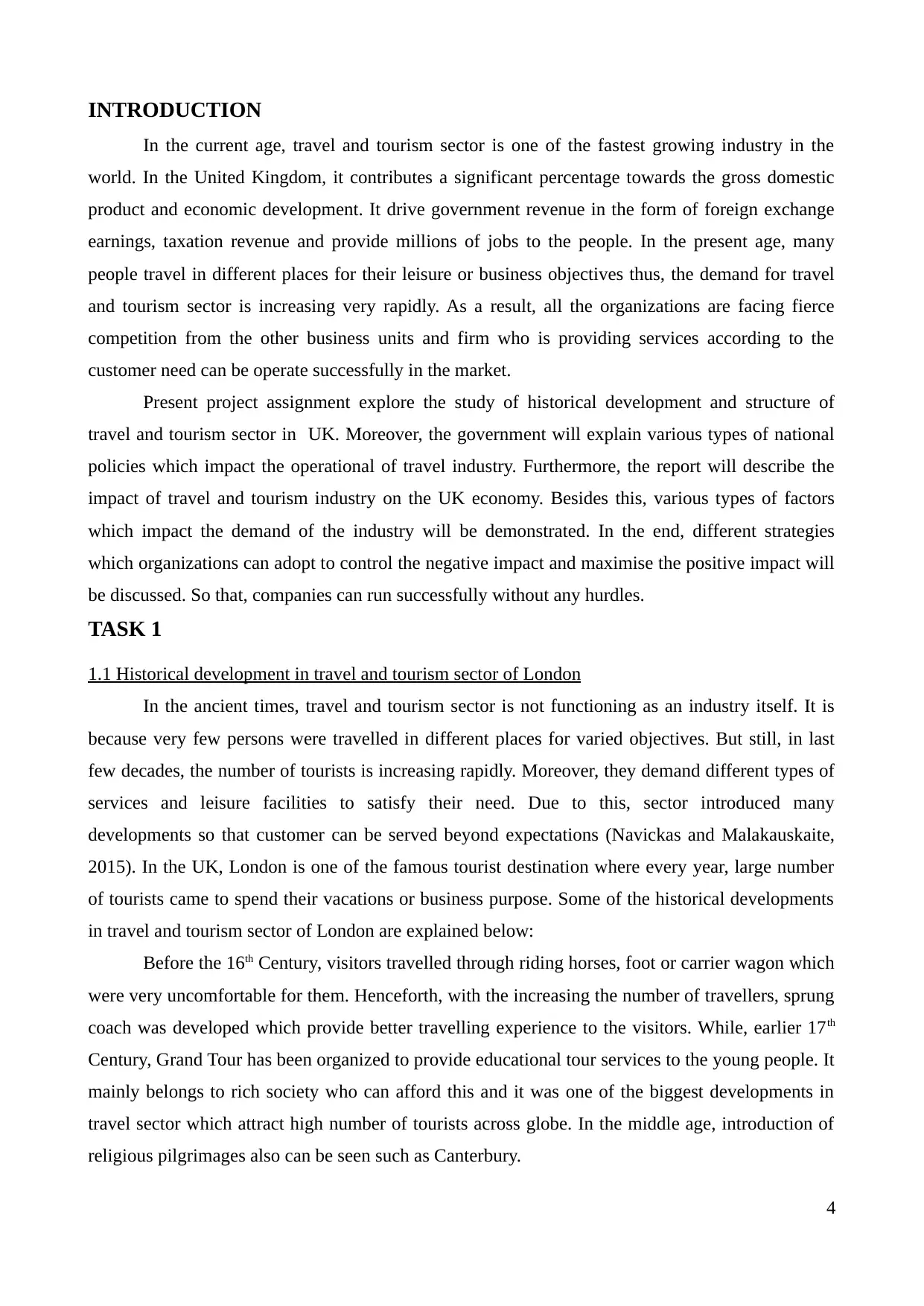
INTRODUCTION
In the current age, travel and tourism sector is one of the fastest growing industry in the
world. In the United Kingdom, it contributes a significant percentage towards the gross domestic
product and economic development. It drive government revenue in the form of foreign exchange
earnings, taxation revenue and provide millions of jobs to the people. In the present age, many
people travel in different places for their leisure or business objectives thus, the demand for travel
and tourism sector is increasing very rapidly. As a result, all the organizations are facing fierce
competition from the other business units and firm who is providing services according to the
customer need can be operate successfully in the market.
Present project assignment explore the study of historical development and structure of
travel and tourism sector in UK. Moreover, the government will explain various types of national
policies which impact the operational of travel industry. Furthermore, the report will describe the
impact of travel and tourism industry on the UK economy. Besides this, various types of factors
which impact the demand of the industry will be demonstrated. In the end, different strategies
which organizations can adopt to control the negative impact and maximise the positive impact will
be discussed. So that, companies can run successfully without any hurdles.
TASK 1
1.1 Historical development in travel and tourism sector of London
In the ancient times, travel and tourism sector is not functioning as an industry itself. It is
because very few persons were travelled in different places for varied objectives. But still, in last
few decades, the number of tourists is increasing rapidly. Moreover, they demand different types of
services and leisure facilities to satisfy their need. Due to this, sector introduced many
developments so that customer can be served beyond expectations (Navickas and Malakauskaite,
2015). In the UK, London is one of the famous tourist destination where every year, large number
of tourists came to spend their vacations or business purpose. Some of the historical developments
in travel and tourism sector of London are explained below:
Before the 16th Century, visitors travelled through riding horses, foot or carrier wagon which
were very uncomfortable for them. Henceforth, with the increasing the number of travellers, sprung
coach was developed which provide better travelling experience to the visitors. While, earlier 17th
Century, Grand Tour has been organized to provide educational tour services to the young people. It
mainly belongs to rich society who can afford this and it was one of the biggest developments in
travel sector which attract high number of tourists across globe. In the middle age, introduction of
religious pilgrimages also can be seen such as Canterbury.
4
In the current age, travel and tourism sector is one of the fastest growing industry in the
world. In the United Kingdom, it contributes a significant percentage towards the gross domestic
product and economic development. It drive government revenue in the form of foreign exchange
earnings, taxation revenue and provide millions of jobs to the people. In the present age, many
people travel in different places for their leisure or business objectives thus, the demand for travel
and tourism sector is increasing very rapidly. As a result, all the organizations are facing fierce
competition from the other business units and firm who is providing services according to the
customer need can be operate successfully in the market.
Present project assignment explore the study of historical development and structure of
travel and tourism sector in UK. Moreover, the government will explain various types of national
policies which impact the operational of travel industry. Furthermore, the report will describe the
impact of travel and tourism industry on the UK economy. Besides this, various types of factors
which impact the demand of the industry will be demonstrated. In the end, different strategies
which organizations can adopt to control the negative impact and maximise the positive impact will
be discussed. So that, companies can run successfully without any hurdles.
TASK 1
1.1 Historical development in travel and tourism sector of London
In the ancient times, travel and tourism sector is not functioning as an industry itself. It is
because very few persons were travelled in different places for varied objectives. But still, in last
few decades, the number of tourists is increasing rapidly. Moreover, they demand different types of
services and leisure facilities to satisfy their need. Due to this, sector introduced many
developments so that customer can be served beyond expectations (Navickas and Malakauskaite,
2015). In the UK, London is one of the famous tourist destination where every year, large number
of tourists came to spend their vacations or business purpose. Some of the historical developments
in travel and tourism sector of London are explained below:
Before the 16th Century, visitors travelled through riding horses, foot or carrier wagon which
were very uncomfortable for them. Henceforth, with the increasing the number of travellers, sprung
coach was developed which provide better travelling experience to the visitors. While, earlier 17th
Century, Grand Tour has been organized to provide educational tour services to the young people. It
mainly belongs to rich society who can afford this and it was one of the biggest developments in
travel sector which attract high number of tourists across globe. In the middle age, introduction of
religious pilgrimages also can be seen such as Canterbury.
4
Secure Best Marks with AI Grader
Need help grading? Try our AI Grader for instant feedback on your assignments.
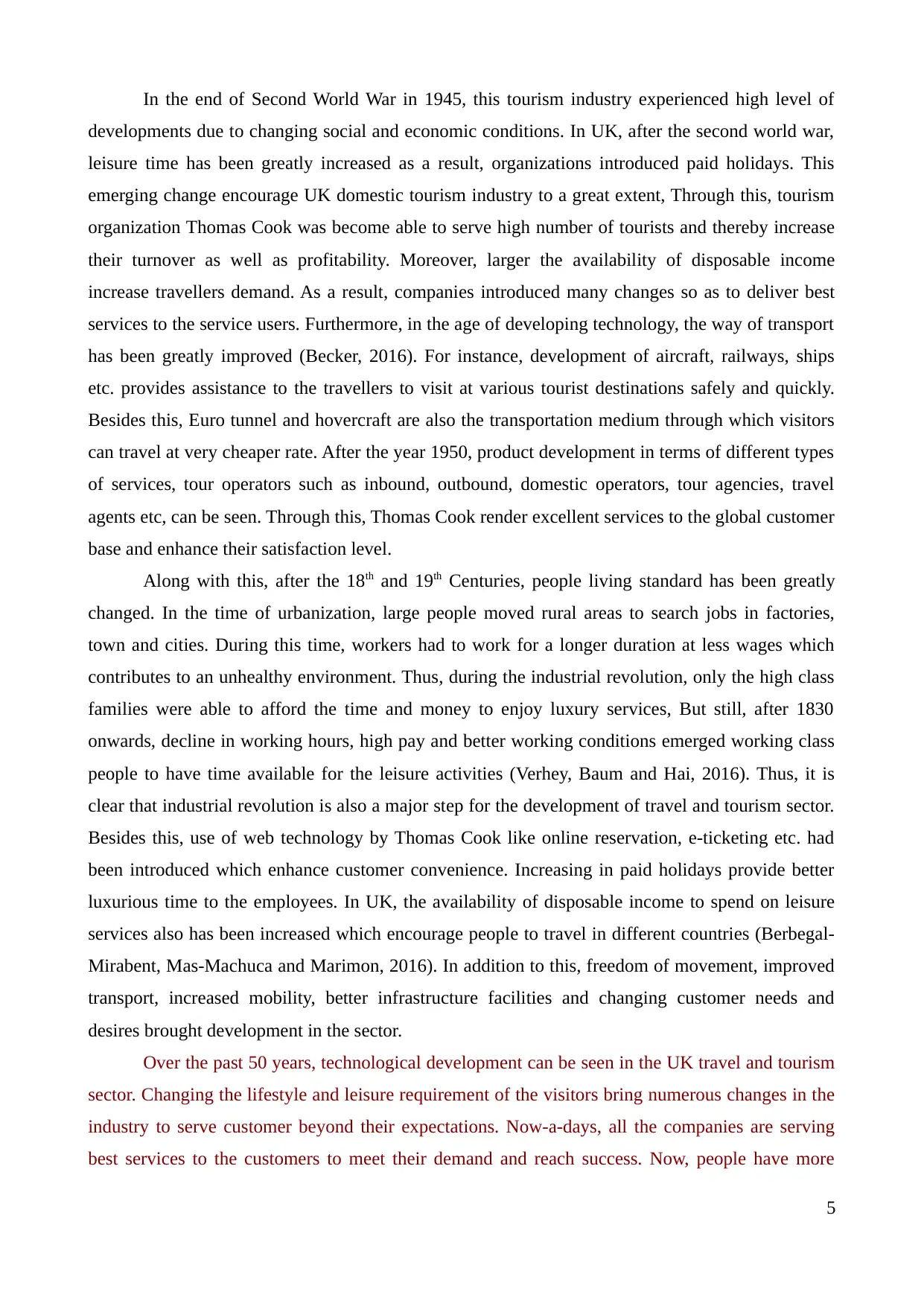
In the end of Second World War in 1945, this tourism industry experienced high level of
developments due to changing social and economic conditions. In UK, after the second world war,
leisure time has been greatly increased as a result, organizations introduced paid holidays. This
emerging change encourage UK domestic tourism industry to a great extent, Through this, tourism
organization Thomas Cook was become able to serve high number of tourists and thereby increase
their turnover as well as profitability. Moreover, larger the availability of disposable income
increase travellers demand. As a result, companies introduced many changes so as to deliver best
services to the service users. Furthermore, in the age of developing technology, the way of transport
has been greatly improved (Becker, 2016). For instance, development of aircraft, railways, ships
etc. provides assistance to the travellers to visit at various tourist destinations safely and quickly.
Besides this, Euro tunnel and hovercraft are also the transportation medium through which visitors
can travel at very cheaper rate. After the year 1950, product development in terms of different types
of services, tour operators such as inbound, outbound, domestic operators, tour agencies, travel
agents etc, can be seen. Through this, Thomas Cook render excellent services to the global customer
base and enhance their satisfaction level.
Along with this, after the 18th and 19th Centuries, people living standard has been greatly
changed. In the time of urbanization, large people moved rural areas to search jobs in factories,
town and cities. During this time, workers had to work for a longer duration at less wages which
contributes to an unhealthy environment. Thus, during the industrial revolution, only the high class
families were able to afford the time and money to enjoy luxury services, But still, after 1830
onwards, decline in working hours, high pay and better working conditions emerged working class
people to have time available for the leisure activities (Verhey, Baum and Hai, 2016). Thus, it is
clear that industrial revolution is also a major step for the development of travel and tourism sector.
Besides this, use of web technology by Thomas Cook like online reservation, e-ticketing etc. had
been introduced which enhance customer convenience. Increasing in paid holidays provide better
luxurious time to the employees. In UK, the availability of disposable income to spend on leisure
services also has been increased which encourage people to travel in different countries (Berbegal-
Mirabent, Mas-Machuca and Marimon, 2016). In addition to this, freedom of movement, improved
transport, increased mobility, better infrastructure facilities and changing customer needs and
desires brought development in the sector.
Over the past 50 years, technological development can be seen in the UK travel and tourism
sector. Changing the lifestyle and leisure requirement of the visitors bring numerous changes in the
industry to serve customer beyond their expectations. Now-a-days, all the companies are serving
best services to the customers to meet their demand and reach success. Now, people have more
5
developments due to changing social and economic conditions. In UK, after the second world war,
leisure time has been greatly increased as a result, organizations introduced paid holidays. This
emerging change encourage UK domestic tourism industry to a great extent, Through this, tourism
organization Thomas Cook was become able to serve high number of tourists and thereby increase
their turnover as well as profitability. Moreover, larger the availability of disposable income
increase travellers demand. As a result, companies introduced many changes so as to deliver best
services to the service users. Furthermore, in the age of developing technology, the way of transport
has been greatly improved (Becker, 2016). For instance, development of aircraft, railways, ships
etc. provides assistance to the travellers to visit at various tourist destinations safely and quickly.
Besides this, Euro tunnel and hovercraft are also the transportation medium through which visitors
can travel at very cheaper rate. After the year 1950, product development in terms of different types
of services, tour operators such as inbound, outbound, domestic operators, tour agencies, travel
agents etc, can be seen. Through this, Thomas Cook render excellent services to the global customer
base and enhance their satisfaction level.
Along with this, after the 18th and 19th Centuries, people living standard has been greatly
changed. In the time of urbanization, large people moved rural areas to search jobs in factories,
town and cities. During this time, workers had to work for a longer duration at less wages which
contributes to an unhealthy environment. Thus, during the industrial revolution, only the high class
families were able to afford the time and money to enjoy luxury services, But still, after 1830
onwards, decline in working hours, high pay and better working conditions emerged working class
people to have time available for the leisure activities (Verhey, Baum and Hai, 2016). Thus, it is
clear that industrial revolution is also a major step for the development of travel and tourism sector.
Besides this, use of web technology by Thomas Cook like online reservation, e-ticketing etc. had
been introduced which enhance customer convenience. Increasing in paid holidays provide better
luxurious time to the employees. In UK, the availability of disposable income to spend on leisure
services also has been increased which encourage people to travel in different countries (Berbegal-
Mirabent, Mas-Machuca and Marimon, 2016). In addition to this, freedom of movement, improved
transport, increased mobility, better infrastructure facilities and changing customer needs and
desires brought development in the sector.
Over the past 50 years, technological development can be seen in the UK travel and tourism
sector. Changing the lifestyle and leisure requirement of the visitors bring numerous changes in the
industry to serve customer beyond their expectations. Now-a-days, all the companies are serving
best services to the customers to meet their demand and reach success. Now, people have more
5
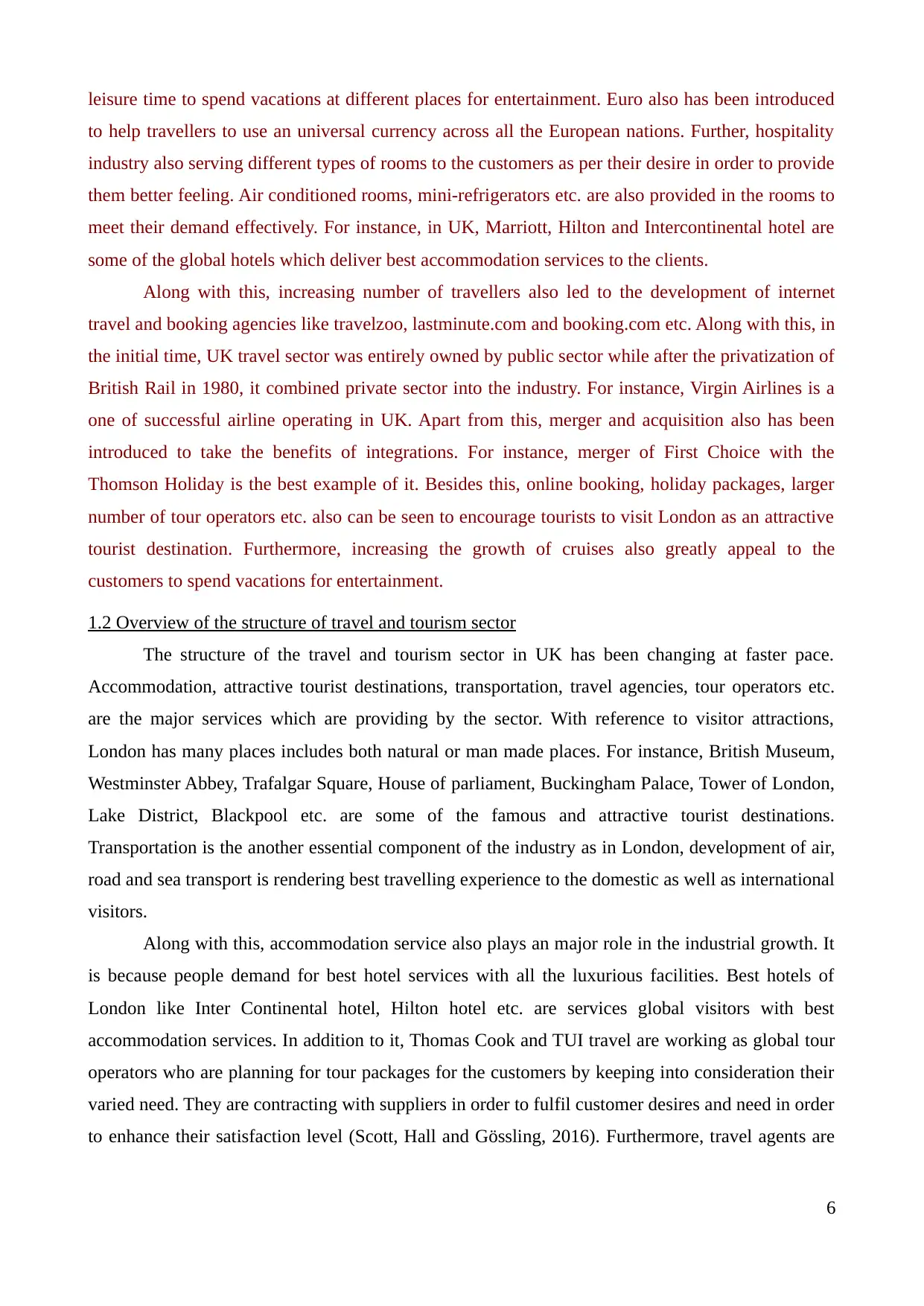
leisure time to spend vacations at different places for entertainment. Euro also has been introduced
to help travellers to use an universal currency across all the European nations. Further, hospitality
industry also serving different types of rooms to the customers as per their desire in order to provide
them better feeling. Air conditioned rooms, mini-refrigerators etc. are also provided in the rooms to
meet their demand effectively. For instance, in UK, Marriott, Hilton and Intercontinental hotel are
some of the global hotels which deliver best accommodation services to the clients.
Along with this, increasing number of travellers also led to the development of internet
travel and booking agencies like travelzoo, lastminute.com and booking.com etc. Along with this, in
the initial time, UK travel sector was entirely owned by public sector while after the privatization of
British Rail in 1980, it combined private sector into the industry. For instance, Virgin Airlines is a
one of successful airline operating in UK. Apart from this, merger and acquisition also has been
introduced to take the benefits of integrations. For instance, merger of First Choice with the
Thomson Holiday is the best example of it. Besides this, online booking, holiday packages, larger
number of tour operators etc. also can be seen to encourage tourists to visit London as an attractive
tourist destination. Furthermore, increasing the growth of cruises also greatly appeal to the
customers to spend vacations for entertainment.
1.2 Overview of the structure of travel and tourism sector
The structure of the travel and tourism sector in UK has been changing at faster pace.
Accommodation, attractive tourist destinations, transportation, travel agencies, tour operators etc.
are the major services which are providing by the sector. With reference to visitor attractions,
London has many places includes both natural or man made places. For instance, British Museum,
Westminster Abbey, Trafalgar Square, House of parliament, Buckingham Palace, Tower of London,
Lake District, Blackpool etc. are some of the famous and attractive tourist destinations.
Transportation is the another essential component of the industry as in London, development of air,
road and sea transport is rendering best travelling experience to the domestic as well as international
visitors.
Along with this, accommodation service also plays an major role in the industrial growth. It
is because people demand for best hotel services with all the luxurious facilities. Best hotels of
London like Inter Continental hotel, Hilton hotel etc. are services global visitors with best
accommodation services. In addition to it, Thomas Cook and TUI travel are working as global tour
operators who are planning for tour packages for the customers by keeping into consideration their
varied need. They are contracting with suppliers in order to fulfil customer desires and need in order
to enhance their satisfaction level (Scott, Hall and Gössling, 2016). Furthermore, travel agents are
6
to help travellers to use an universal currency across all the European nations. Further, hospitality
industry also serving different types of rooms to the customers as per their desire in order to provide
them better feeling. Air conditioned rooms, mini-refrigerators etc. are also provided in the rooms to
meet their demand effectively. For instance, in UK, Marriott, Hilton and Intercontinental hotel are
some of the global hotels which deliver best accommodation services to the clients.
Along with this, increasing number of travellers also led to the development of internet
travel and booking agencies like travelzoo, lastminute.com and booking.com etc. Along with this, in
the initial time, UK travel sector was entirely owned by public sector while after the privatization of
British Rail in 1980, it combined private sector into the industry. For instance, Virgin Airlines is a
one of successful airline operating in UK. Apart from this, merger and acquisition also has been
introduced to take the benefits of integrations. For instance, merger of First Choice with the
Thomson Holiday is the best example of it. Besides this, online booking, holiday packages, larger
number of tour operators etc. also can be seen to encourage tourists to visit London as an attractive
tourist destination. Furthermore, increasing the growth of cruises also greatly appeal to the
customers to spend vacations for entertainment.
1.2 Overview of the structure of travel and tourism sector
The structure of the travel and tourism sector in UK has been changing at faster pace.
Accommodation, attractive tourist destinations, transportation, travel agencies, tour operators etc.
are the major services which are providing by the sector. With reference to visitor attractions,
London has many places includes both natural or man made places. For instance, British Museum,
Westminster Abbey, Trafalgar Square, House of parliament, Buckingham Palace, Tower of London,
Lake District, Blackpool etc. are some of the famous and attractive tourist destinations.
Transportation is the another essential component of the industry as in London, development of air,
road and sea transport is rendering best travelling experience to the domestic as well as international
visitors.
Along with this, accommodation service also plays an major role in the industrial growth. It
is because people demand for best hotel services with all the luxurious facilities. Best hotels of
London like Inter Continental hotel, Hilton hotel etc. are services global visitors with best
accommodation services. In addition to it, Thomas Cook and TUI travel are working as global tour
operators who are planning for tour packages for the customers by keeping into consideration their
varied need. They are contracting with suppliers in order to fulfil customer desires and need in order
to enhance their satisfaction level (Scott, Hall and Gössling, 2016). Furthermore, travel agents are
6
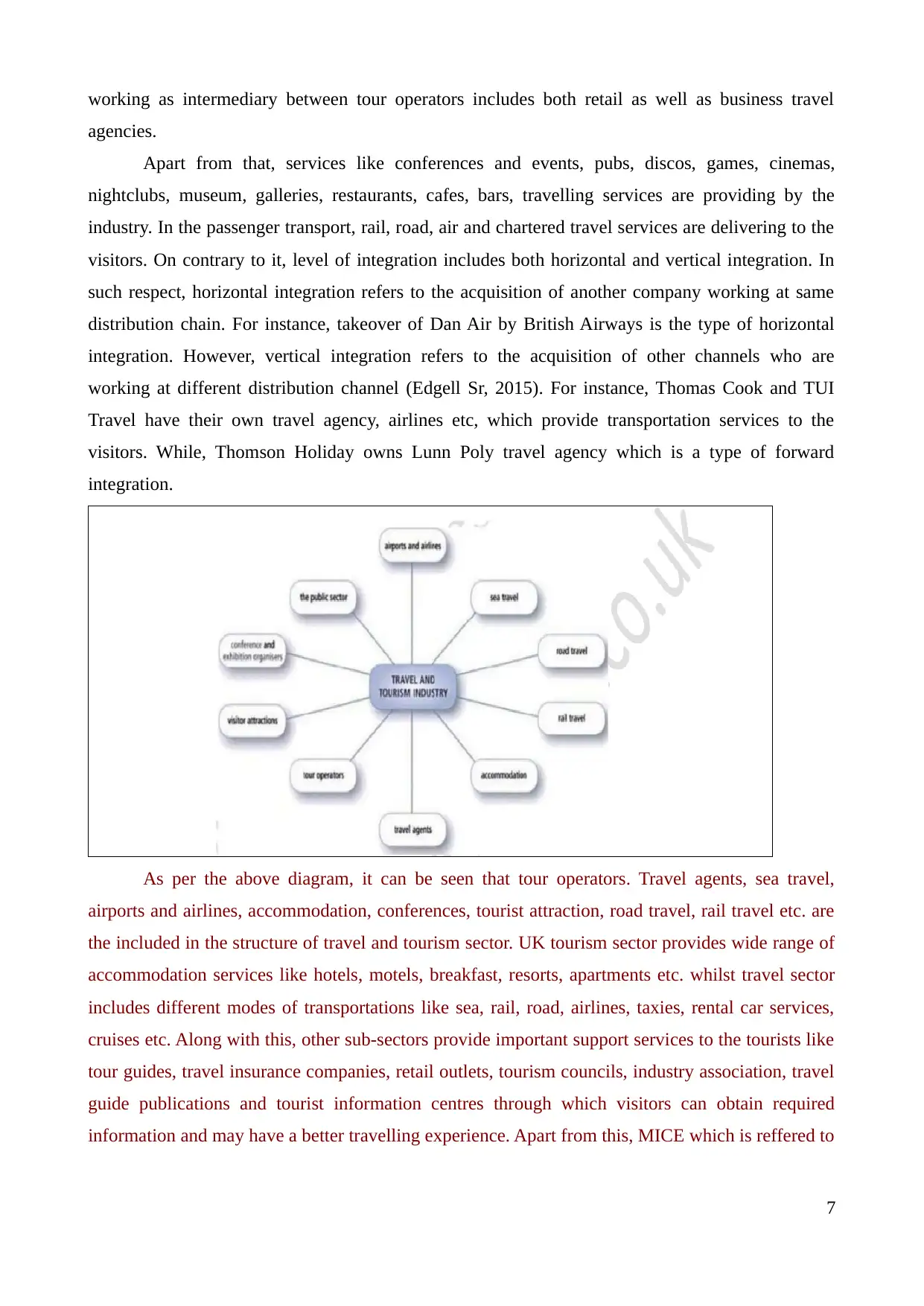
working as intermediary between tour operators includes both retail as well as business travel
agencies.
Apart from that, services like conferences and events, pubs, discos, games, cinemas,
nightclubs, museum, galleries, restaurants, cafes, bars, travelling services are providing by the
industry. In the passenger transport, rail, road, air and chartered travel services are delivering to the
visitors. On contrary to it, level of integration includes both horizontal and vertical integration. In
such respect, horizontal integration refers to the acquisition of another company working at same
distribution chain. For instance, takeover of Dan Air by British Airways is the type of horizontal
integration. However, vertical integration refers to the acquisition of other channels who are
working at different distribution channel (Edgell Sr, 2015). For instance, Thomas Cook and TUI
Travel have their own travel agency, airlines etc, which provide transportation services to the
visitors. While, Thomson Holiday owns Lunn Poly travel agency which is a type of forward
integration.
As per the above diagram, it can be seen that tour operators. Travel agents, sea travel,
airports and airlines, accommodation, conferences, tourist attraction, road travel, rail travel etc. are
the included in the structure of travel and tourism sector. UK tourism sector provides wide range of
accommodation services like hotels, motels, breakfast, resorts, apartments etc. whilst travel sector
includes different modes of transportations like sea, rail, road, airlines, taxies, rental car services,
cruises etc. Along with this, other sub-sectors provide important support services to the tourists like
tour guides, travel insurance companies, retail outlets, tourism councils, industry association, travel
guide publications and tourist information centres through which visitors can obtain required
information and may have a better travelling experience. Apart from this, MICE which is reffered to
7
agencies.
Apart from that, services like conferences and events, pubs, discos, games, cinemas,
nightclubs, museum, galleries, restaurants, cafes, bars, travelling services are providing by the
industry. In the passenger transport, rail, road, air and chartered travel services are delivering to the
visitors. On contrary to it, level of integration includes both horizontal and vertical integration. In
such respect, horizontal integration refers to the acquisition of another company working at same
distribution chain. For instance, takeover of Dan Air by British Airways is the type of horizontal
integration. However, vertical integration refers to the acquisition of other channels who are
working at different distribution channel (Edgell Sr, 2015). For instance, Thomas Cook and TUI
Travel have their own travel agency, airlines etc, which provide transportation services to the
visitors. While, Thomson Holiday owns Lunn Poly travel agency which is a type of forward
integration.
As per the above diagram, it can be seen that tour operators. Travel agents, sea travel,
airports and airlines, accommodation, conferences, tourist attraction, road travel, rail travel etc. are
the included in the structure of travel and tourism sector. UK tourism sector provides wide range of
accommodation services like hotels, motels, breakfast, resorts, apartments etc. whilst travel sector
includes different modes of transportations like sea, rail, road, airlines, taxies, rental car services,
cruises etc. Along with this, other sub-sectors provide important support services to the tourists like
tour guides, travel insurance companies, retail outlets, tourism councils, industry association, travel
guide publications and tourist information centres through which visitors can obtain required
information and may have a better travelling experience. Apart from this, MICE which is reffered to
7
Paraphrase This Document
Need a fresh take? Get an instant paraphrase of this document with our AI Paraphraser
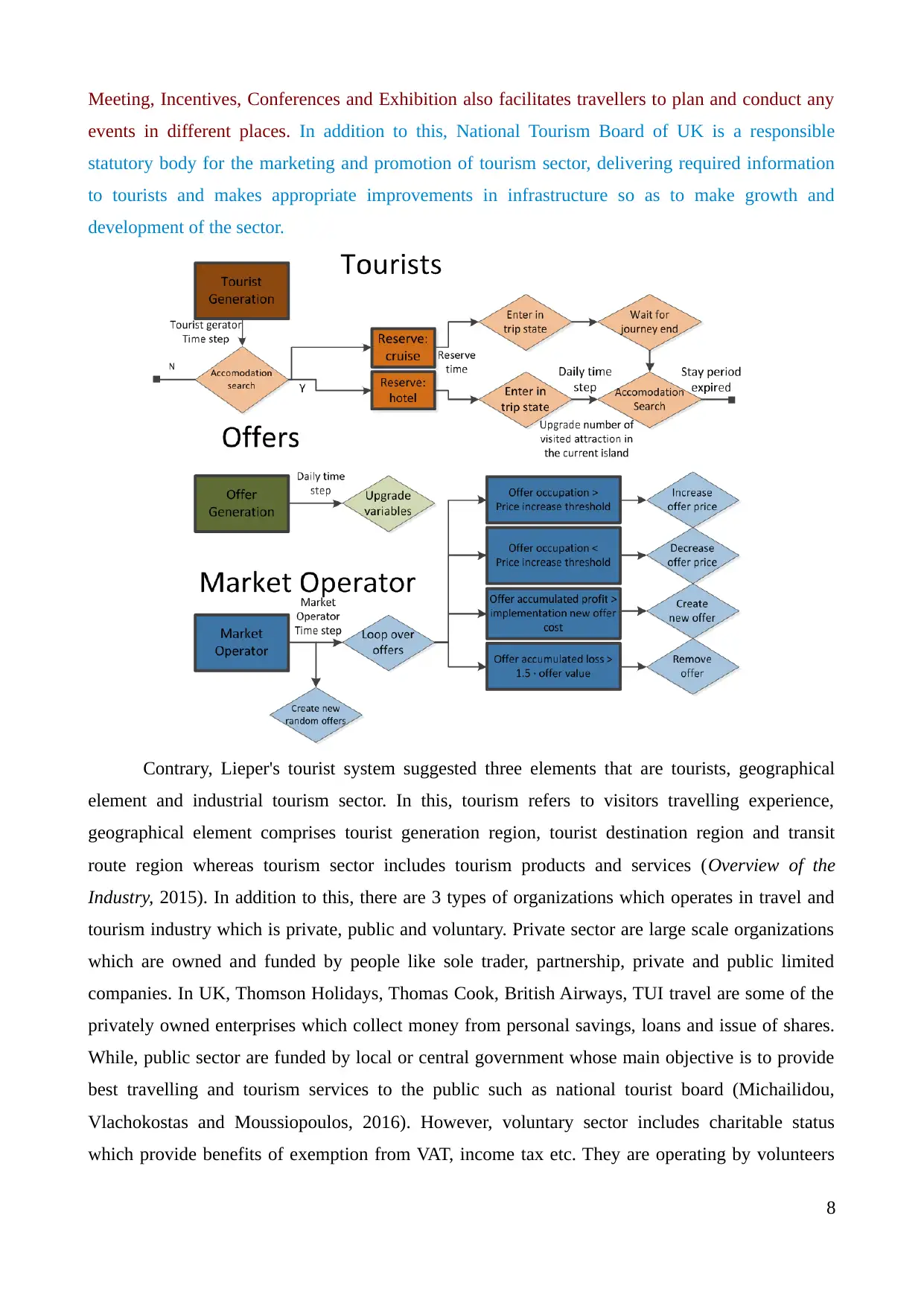
Meeting, Incentives, Conferences and Exhibition also facilitates travellers to plan and conduct any
events in different places. In addition to this, National Tourism Board of UK is a responsible
statutory body for the marketing and promotion of tourism sector, delivering required information
to tourists and makes appropriate improvements in infrastructure so as to make growth and
development of the sector.
Contrary, Lieper's tourist system suggested three elements that are tourists, geographical
element and industrial tourism sector. In this, tourism refers to visitors travelling experience,
geographical element comprises tourist generation region, tourist destination region and transit
route region whereas tourism sector includes tourism products and services (Overview of the
Industry, 2015). In addition to this, there are 3 types of organizations which operates in travel and
tourism industry which is private, public and voluntary. Private sector are large scale organizations
which are owned and funded by people like sole trader, partnership, private and public limited
companies. In UK, Thomson Holidays, Thomas Cook, British Airways, TUI travel are some of the
privately owned enterprises which collect money from personal savings, loans and issue of shares.
While, public sector are funded by local or central government whose main objective is to provide
best travelling and tourism services to the public such as national tourist board (Michailidou,
Vlachokostas and Moussiopoulos, 2016). However, voluntary sector includes charitable status
which provide benefits of exemption from VAT, income tax etc. They are operating by volunteers
8
events in different places. In addition to this, National Tourism Board of UK is a responsible
statutory body for the marketing and promotion of tourism sector, delivering required information
to tourists and makes appropriate improvements in infrastructure so as to make growth and
development of the sector.
Contrary, Lieper's tourist system suggested three elements that are tourists, geographical
element and industrial tourism sector. In this, tourism refers to visitors travelling experience,
geographical element comprises tourist generation region, tourist destination region and transit
route region whereas tourism sector includes tourism products and services (Overview of the
Industry, 2015). In addition to this, there are 3 types of organizations which operates in travel and
tourism industry which is private, public and voluntary. Private sector are large scale organizations
which are owned and funded by people like sole trader, partnership, private and public limited
companies. In UK, Thomson Holidays, Thomas Cook, British Airways, TUI travel are some of the
privately owned enterprises which collect money from personal savings, loans and issue of shares.
While, public sector are funded by local or central government whose main objective is to provide
best travelling and tourism services to the public such as national tourist board (Michailidou,
Vlachokostas and Moussiopoulos, 2016). However, voluntary sector includes charitable status
which provide benefits of exemption from VAT, income tax etc. They are operating by volunteers
8
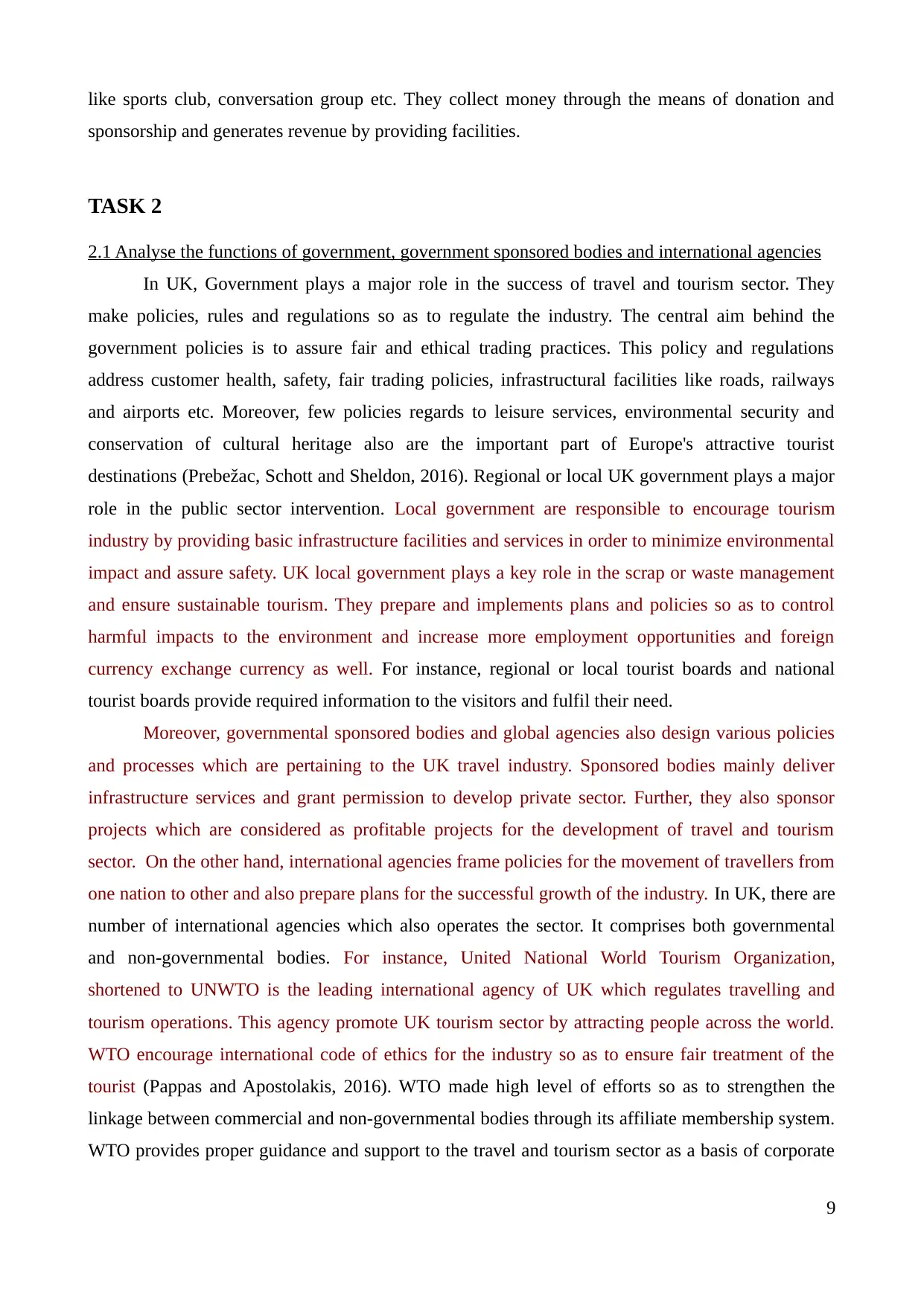
like sports club, conversation group etc. They collect money through the means of donation and
sponsorship and generates revenue by providing facilities.
TASK 2
2.1 Analyse the functions of government, government sponsored bodies and international agencies
In UK, Government plays a major role in the success of travel and tourism sector. They
make policies, rules and regulations so as to regulate the industry. The central aim behind the
government policies is to assure fair and ethical trading practices. This policy and regulations
address customer health, safety, fair trading policies, infrastructural facilities like roads, railways
and airports etc. Moreover, few policies regards to leisure services, environmental security and
conservation of cultural heritage also are the important part of Europe's attractive tourist
destinations (Prebežac, Schott and Sheldon, 2016). Regional or local UK government plays a major
role in the public sector intervention. Local government are responsible to encourage tourism
industry by providing basic infrastructure facilities and services in order to minimize environmental
impact and assure safety. UK local government plays a key role in the scrap or waste management
and ensure sustainable tourism. They prepare and implements plans and policies so as to control
harmful impacts to the environment and increase more employment opportunities and foreign
currency exchange currency as well. For instance, regional or local tourist boards and national
tourist boards provide required information to the visitors and fulfil their need.
Moreover, governmental sponsored bodies and global agencies also design various policies
and processes which are pertaining to the UK travel industry. Sponsored bodies mainly deliver
infrastructure services and grant permission to develop private sector. Further, they also sponsor
projects which are considered as profitable projects for the development of travel and tourism
sector. On the other hand, international agencies frame policies for the movement of travellers from
one nation to other and also prepare plans for the successful growth of the industry. In UK, there are
number of international agencies which also operates the sector. It comprises both governmental
and non-governmental bodies. For instance, United National World Tourism Organization,
shortened to UNWTO is the leading international agency of UK which regulates travelling and
tourism operations. This agency promote UK tourism sector by attracting people across the world.
WTO encourage international code of ethics for the industry so as to ensure fair treatment of the
tourist (Pappas and Apostolakis, 2016). WTO made high level of efforts so as to strengthen the
linkage between commercial and non-governmental bodies through its affiliate membership system.
WTO provides proper guidance and support to the travel and tourism sector as a basis of corporate
9
sponsorship and generates revenue by providing facilities.
TASK 2
2.1 Analyse the functions of government, government sponsored bodies and international agencies
In UK, Government plays a major role in the success of travel and tourism sector. They
make policies, rules and regulations so as to regulate the industry. The central aim behind the
government policies is to assure fair and ethical trading practices. This policy and regulations
address customer health, safety, fair trading policies, infrastructural facilities like roads, railways
and airports etc. Moreover, few policies regards to leisure services, environmental security and
conservation of cultural heritage also are the important part of Europe's attractive tourist
destinations (Prebežac, Schott and Sheldon, 2016). Regional or local UK government plays a major
role in the public sector intervention. Local government are responsible to encourage tourism
industry by providing basic infrastructure facilities and services in order to minimize environmental
impact and assure safety. UK local government plays a key role in the scrap or waste management
and ensure sustainable tourism. They prepare and implements plans and policies so as to control
harmful impacts to the environment and increase more employment opportunities and foreign
currency exchange currency as well. For instance, regional or local tourist boards and national
tourist boards provide required information to the visitors and fulfil their need.
Moreover, governmental sponsored bodies and global agencies also design various policies
and processes which are pertaining to the UK travel industry. Sponsored bodies mainly deliver
infrastructure services and grant permission to develop private sector. Further, they also sponsor
projects which are considered as profitable projects for the development of travel and tourism
sector. On the other hand, international agencies frame policies for the movement of travellers from
one nation to other and also prepare plans for the successful growth of the industry. In UK, there are
number of international agencies which also operates the sector. It comprises both governmental
and non-governmental bodies. For instance, United National World Tourism Organization,
shortened to UNWTO is the leading international agency of UK which regulates travelling and
tourism operations. This agency promote UK tourism sector by attracting people across the world.
WTO encourage international code of ethics for the industry so as to ensure fair treatment of the
tourist (Pappas and Apostolakis, 2016). WTO made high level of efforts so as to strengthen the
linkage between commercial and non-governmental bodies through its affiliate membership system.
WTO provides proper guidance and support to the travel and tourism sector as a basis of corporate
9
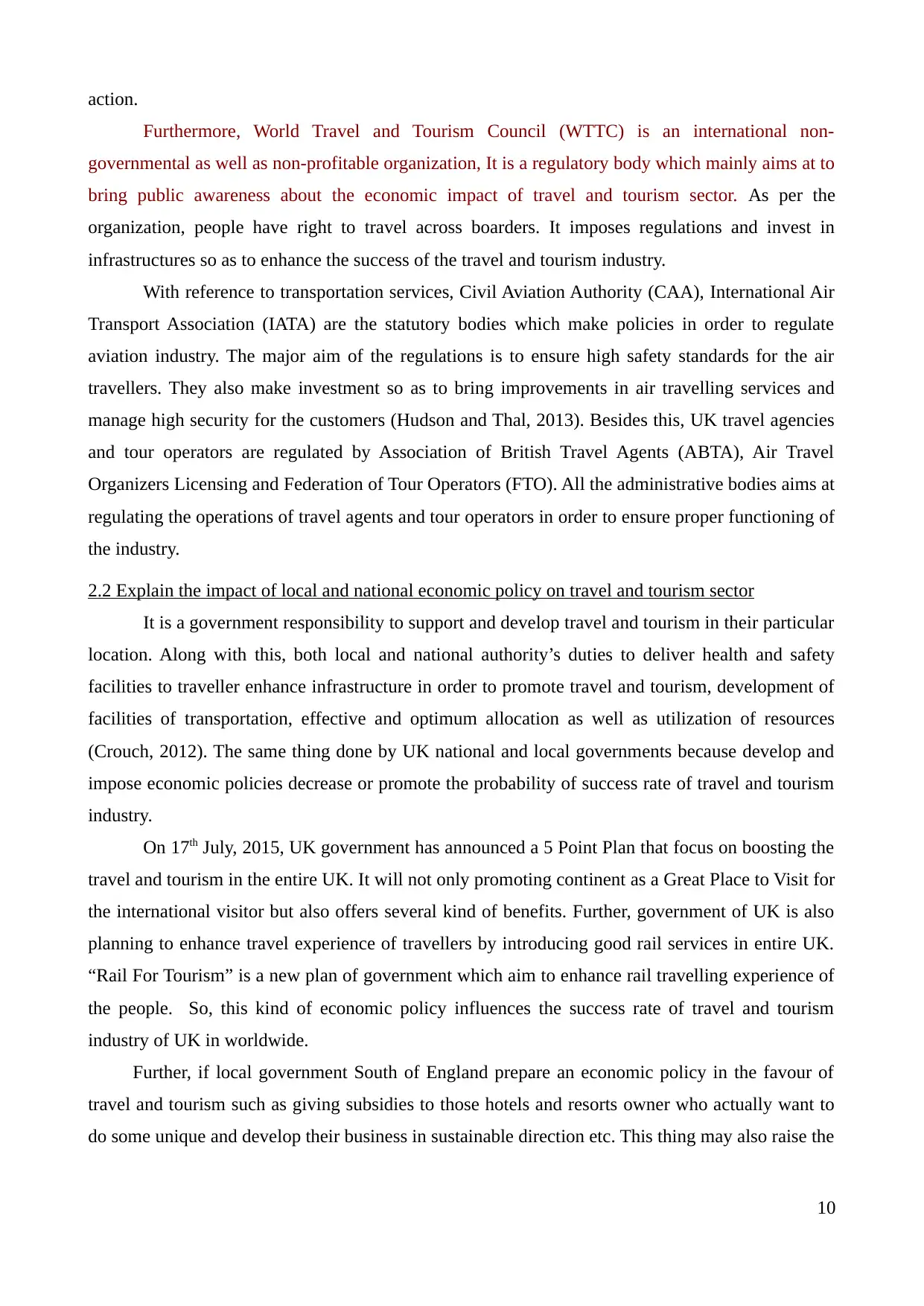
action.
Furthermore, World Travel and Tourism Council (WTTC) is an international non-
governmental as well as non-profitable organization, It is a regulatory body which mainly aims at to
bring public awareness about the economic impact of travel and tourism sector. As per the
organization, people have right to travel across boarders. It imposes regulations and invest in
infrastructures so as to enhance the success of the travel and tourism industry.
With reference to transportation services, Civil Aviation Authority (CAA), International Air
Transport Association (IATA) are the statutory bodies which make policies in order to regulate
aviation industry. The major aim of the regulations is to ensure high safety standards for the air
travellers. They also make investment so as to bring improvements in air travelling services and
manage high security for the customers (Hudson and Thal, 2013). Besides this, UK travel agencies
and tour operators are regulated by Association of British Travel Agents (ABTA), Air Travel
Organizers Licensing and Federation of Tour Operators (FTO). All the administrative bodies aims at
regulating the operations of travel agents and tour operators in order to ensure proper functioning of
the industry.
2.2 Explain the impact of local and national economic policy on travel and tourism sector
It is a government responsibility to support and develop travel and tourism in their particular
location. Along with this, both local and national authority’s duties to deliver health and safety
facilities to traveller enhance infrastructure in order to promote travel and tourism, development of
facilities of transportation, effective and optimum allocation as well as utilization of resources
(Crouch, 2012). The same thing done by UK national and local governments because develop and
impose economic policies decrease or promote the probability of success rate of travel and tourism
industry.
On 17th July, 2015, UK government has announced a 5 Point Plan that focus on boosting the
travel and tourism in the entire UK. It will not only promoting continent as a Great Place to Visit for
the international visitor but also offers several kind of benefits. Further, government of UK is also
planning to enhance travel experience of travellers by introducing good rail services in entire UK.
“Rail For Tourism” is a new plan of government which aim to enhance rail travelling experience of
the people. So, this kind of economic policy influences the success rate of travel and tourism
industry of UK in worldwide.
Further, if local government South of England prepare an economic policy in the favour of
travel and tourism such as giving subsidies to those hotels and resorts owner who actually want to
do some unique and develop their business in sustainable direction etc. This thing may also raise the
10
Furthermore, World Travel and Tourism Council (WTTC) is an international non-
governmental as well as non-profitable organization, It is a regulatory body which mainly aims at to
bring public awareness about the economic impact of travel and tourism sector. As per the
organization, people have right to travel across boarders. It imposes regulations and invest in
infrastructures so as to enhance the success of the travel and tourism industry.
With reference to transportation services, Civil Aviation Authority (CAA), International Air
Transport Association (IATA) are the statutory bodies which make policies in order to regulate
aviation industry. The major aim of the regulations is to ensure high safety standards for the air
travellers. They also make investment so as to bring improvements in air travelling services and
manage high security for the customers (Hudson and Thal, 2013). Besides this, UK travel agencies
and tour operators are regulated by Association of British Travel Agents (ABTA), Air Travel
Organizers Licensing and Federation of Tour Operators (FTO). All the administrative bodies aims at
regulating the operations of travel agents and tour operators in order to ensure proper functioning of
the industry.
2.2 Explain the impact of local and national economic policy on travel and tourism sector
It is a government responsibility to support and develop travel and tourism in their particular
location. Along with this, both local and national authority’s duties to deliver health and safety
facilities to traveller enhance infrastructure in order to promote travel and tourism, development of
facilities of transportation, effective and optimum allocation as well as utilization of resources
(Crouch, 2012). The same thing done by UK national and local governments because develop and
impose economic policies decrease or promote the probability of success rate of travel and tourism
industry.
On 17th July, 2015, UK government has announced a 5 Point Plan that focus on boosting the
travel and tourism in the entire UK. It will not only promoting continent as a Great Place to Visit for
the international visitor but also offers several kind of benefits. Further, government of UK is also
planning to enhance travel experience of travellers by introducing good rail services in entire UK.
“Rail For Tourism” is a new plan of government which aim to enhance rail travelling experience of
the people. So, this kind of economic policy influences the success rate of travel and tourism
industry of UK in worldwide.
Further, if local government South of England prepare an economic policy in the favour of
travel and tourism such as giving subsidies to those hotels and resorts owner who actually want to
do some unique and develop their business in sustainable direction etc. This thing may also raise the
10
Secure Best Marks with AI Grader
Need help grading? Try our AI Grader for instant feedback on your assignments.
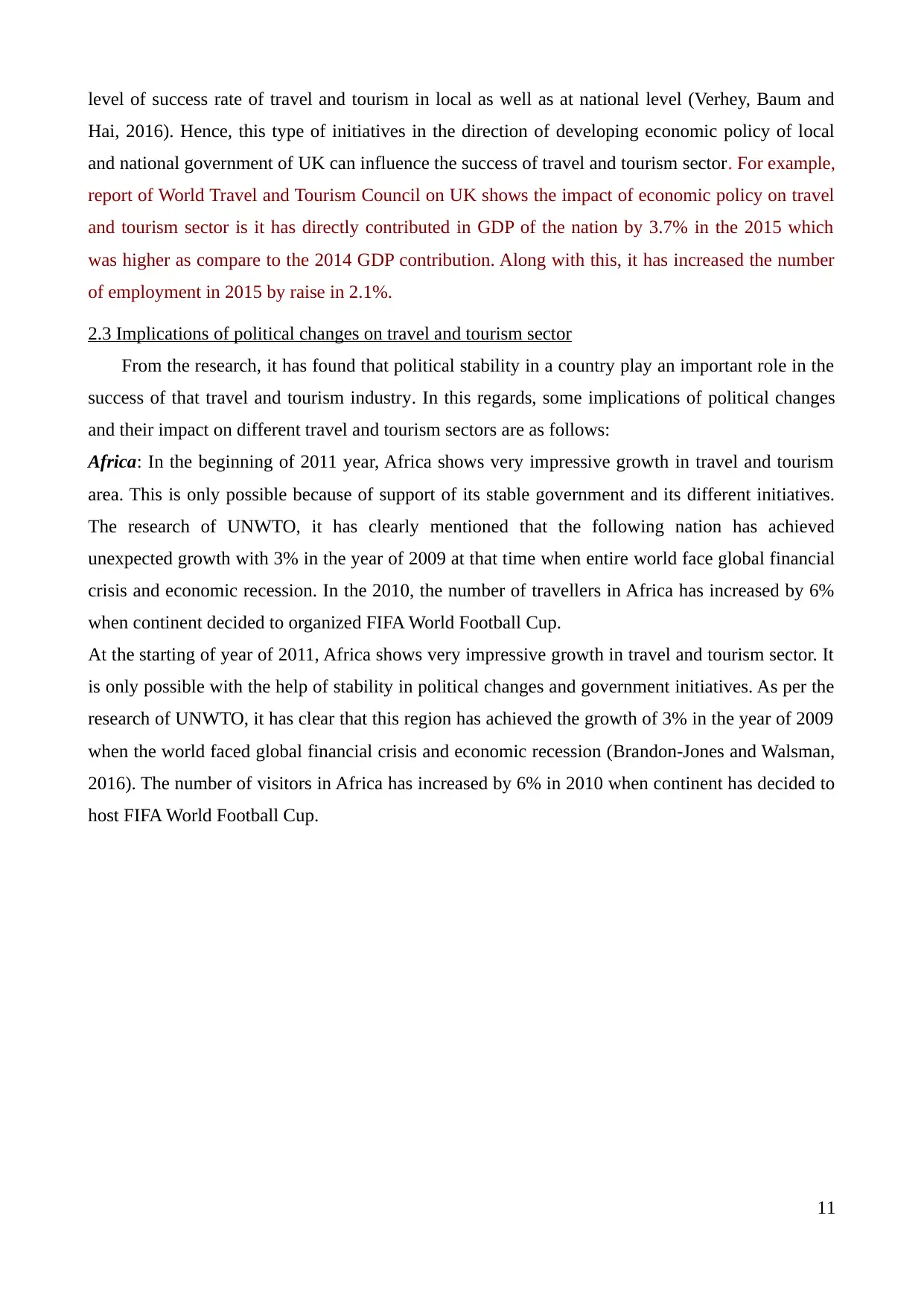
level of success rate of travel and tourism in local as well as at national level (Verhey, Baum and
Hai, 2016). Hence, this type of initiatives in the direction of developing economic policy of local
and national government of UK can influence the success of travel and tourism sector. For example,
report of World Travel and Tourism Council on UK shows the impact of economic policy on travel
and tourism sector is it has directly contributed in GDP of the nation by 3.7% in the 2015 which
was higher as compare to the 2014 GDP contribution. Along with this, it has increased the number
of employment in 2015 by raise in 2.1%.
2.3 Implications of political changes on travel and tourism sector
From the research, it has found that political stability in a country play an important role in the
success of that travel and tourism industry. In this regards, some implications of political changes
and their impact on different travel and tourism sectors are as follows:
Africa: In the beginning of 2011 year, Africa shows very impressive growth in travel and tourism
area. This is only possible because of support of its stable government and its different initiatives.
The research of UNWTO, it has clearly mentioned that the following nation has achieved
unexpected growth with 3% in the year of 2009 at that time when entire world face global financial
crisis and economic recession. In the 2010, the number of travellers in Africa has increased by 6%
when continent decided to organized FIFA World Football Cup.
At the starting of year of 2011, Africa shows very impressive growth in travel and tourism sector. It
is only possible with the help of stability in political changes and government initiatives. As per the
research of UNWTO, it has clear that this region has achieved the growth of 3% in the year of 2009
when the world faced global financial crisis and economic recession (Brandon-Jones and Walsman,
2016). The number of visitors in Africa has increased by 6% in 2010 when continent has decided to
host FIFA World Football Cup.
11
Hai, 2016). Hence, this type of initiatives in the direction of developing economic policy of local
and national government of UK can influence the success of travel and tourism sector. For example,
report of World Travel and Tourism Council on UK shows the impact of economic policy on travel
and tourism sector is it has directly contributed in GDP of the nation by 3.7% in the 2015 which
was higher as compare to the 2014 GDP contribution. Along with this, it has increased the number
of employment in 2015 by raise in 2.1%.
2.3 Implications of political changes on travel and tourism sector
From the research, it has found that political stability in a country play an important role in the
success of that travel and tourism industry. In this regards, some implications of political changes
and their impact on different travel and tourism sectors are as follows:
Africa: In the beginning of 2011 year, Africa shows very impressive growth in travel and tourism
area. This is only possible because of support of its stable government and its different initiatives.
The research of UNWTO, it has clearly mentioned that the following nation has achieved
unexpected growth with 3% in the year of 2009 at that time when entire world face global financial
crisis and economic recession. In the 2010, the number of travellers in Africa has increased by 6%
when continent decided to organized FIFA World Football Cup.
At the starting of year of 2011, Africa shows very impressive growth in travel and tourism sector. It
is only possible with the help of stability in political changes and government initiatives. As per the
research of UNWTO, it has clear that this region has achieved the growth of 3% in the year of 2009
when the world faced global financial crisis and economic recession (Brandon-Jones and Walsman,
2016). The number of visitors in Africa has increased by 6% in 2010 when continent has decided to
host FIFA World Football Cup.
11
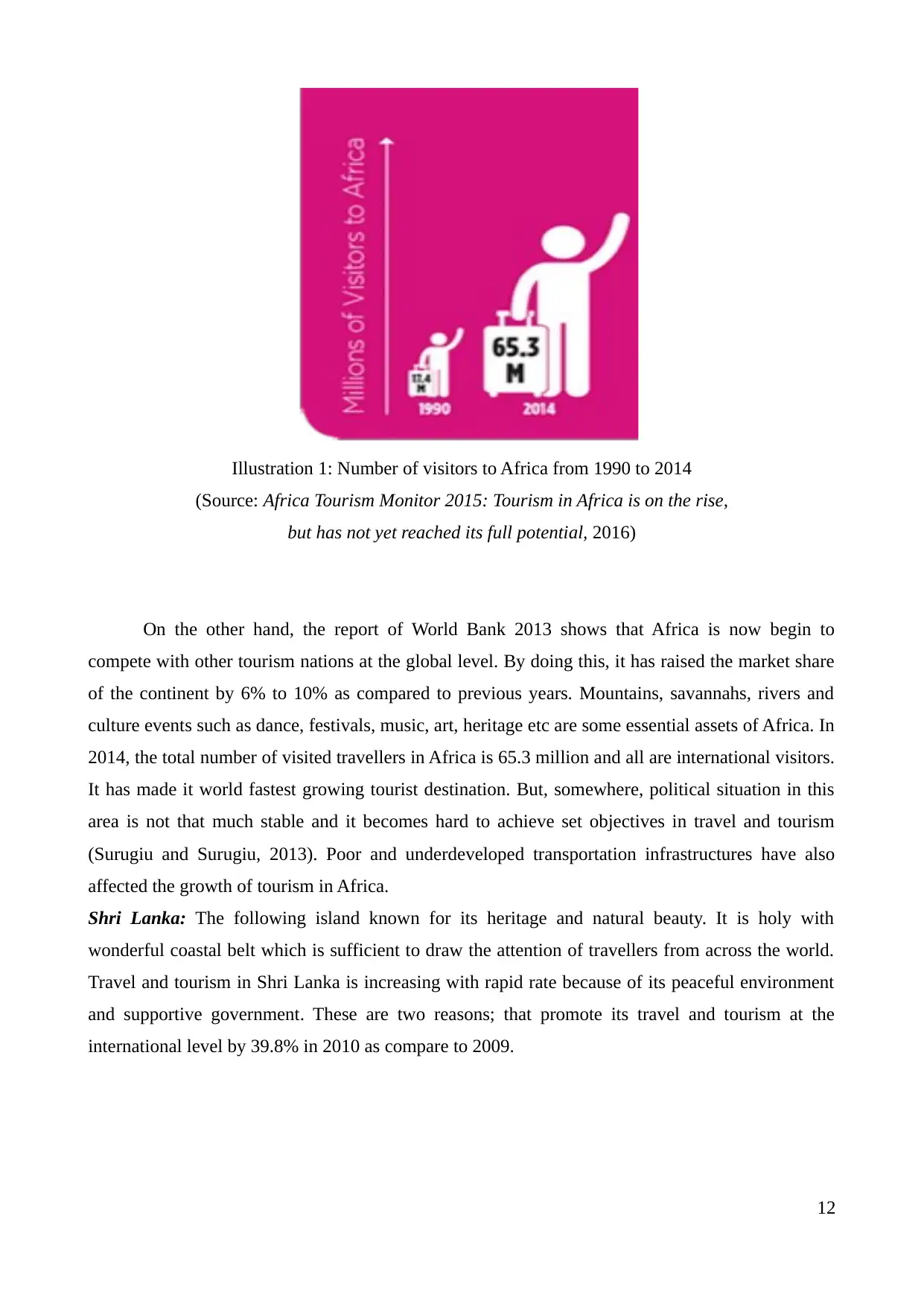
On the other hand, the report of World Bank 2013 shows that Africa is now begin to
compete with other tourism nations at the global level. By doing this, it has raised the market share
of the continent by 6% to 10% as compared to previous years. Mountains, savannahs, rivers and
culture events such as dance, festivals, music, art, heritage etc are some essential assets of Africa. In
2014, the total number of visited travellers in Africa is 65.3 million and all are international visitors.
It has made it world fastest growing tourist destination. But, somewhere, political situation in this
area is not that much stable and it becomes hard to achieve set objectives in travel and tourism
(Surugiu and Surugiu, 2013). Poor and underdeveloped transportation infrastructures have also
affected the growth of tourism in Africa.
Shri Lanka: The following island known for its heritage and natural beauty. It is holy with
wonderful coastal belt which is sufficient to draw the attention of travellers from across the world.
Travel and tourism in Shri Lanka is increasing with rapid rate because of its peaceful environment
and supportive government. These are two reasons; that promote its travel and tourism at the
international level by 39.8% in 2010 as compare to 2009.
12
Illustration 1: Number of visitors to Africa from 1990 to 2014
(Source: Africa Tourism Monitor 2015: Tourism in Africa is on the rise,
but has not yet reached its full potential, 2016)
compete with other tourism nations at the global level. By doing this, it has raised the market share
of the continent by 6% to 10% as compared to previous years. Mountains, savannahs, rivers and
culture events such as dance, festivals, music, art, heritage etc are some essential assets of Africa. In
2014, the total number of visited travellers in Africa is 65.3 million and all are international visitors.
It has made it world fastest growing tourist destination. But, somewhere, political situation in this
area is not that much stable and it becomes hard to achieve set objectives in travel and tourism
(Surugiu and Surugiu, 2013). Poor and underdeveloped transportation infrastructures have also
affected the growth of tourism in Africa.
Shri Lanka: The following island known for its heritage and natural beauty. It is holy with
wonderful coastal belt which is sufficient to draw the attention of travellers from across the world.
Travel and tourism in Shri Lanka is increasing with rapid rate because of its peaceful environment
and supportive government. These are two reasons; that promote its travel and tourism at the
international level by 39.8% in 2010 as compare to 2009.
12
Illustration 1: Number of visitors to Africa from 1990 to 2014
(Source: Africa Tourism Monitor 2015: Tourism in Africa is on the rise,
but has not yet reached its full potential, 2016)
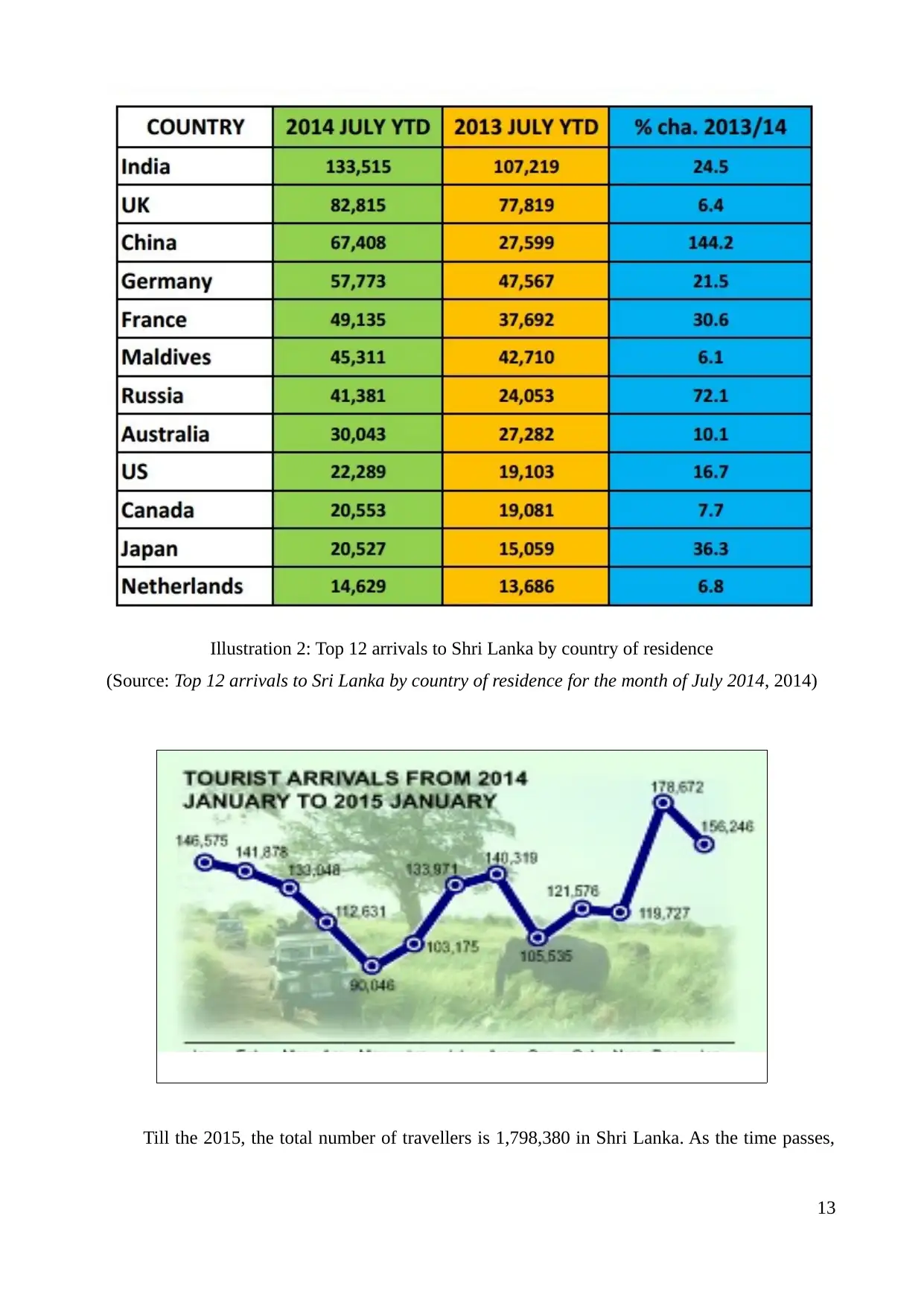
Till the 2015, the total number of travellers is 1,798,380 in Shri Lanka. As the time passes,
13
Illustration 2: Top 12 arrivals to Shri Lanka by country of residence
(Source: Top 12 arrivals to Sri Lanka by country of residence for the month of July 2014, 2014)
13
Illustration 2: Top 12 arrivals to Shri Lanka by country of residence
(Source: Top 12 arrivals to Sri Lanka by country of residence for the month of July 2014, 2014)
Paraphrase This Document
Need a fresh take? Get an instant paraphrase of this document with our AI Paraphraser
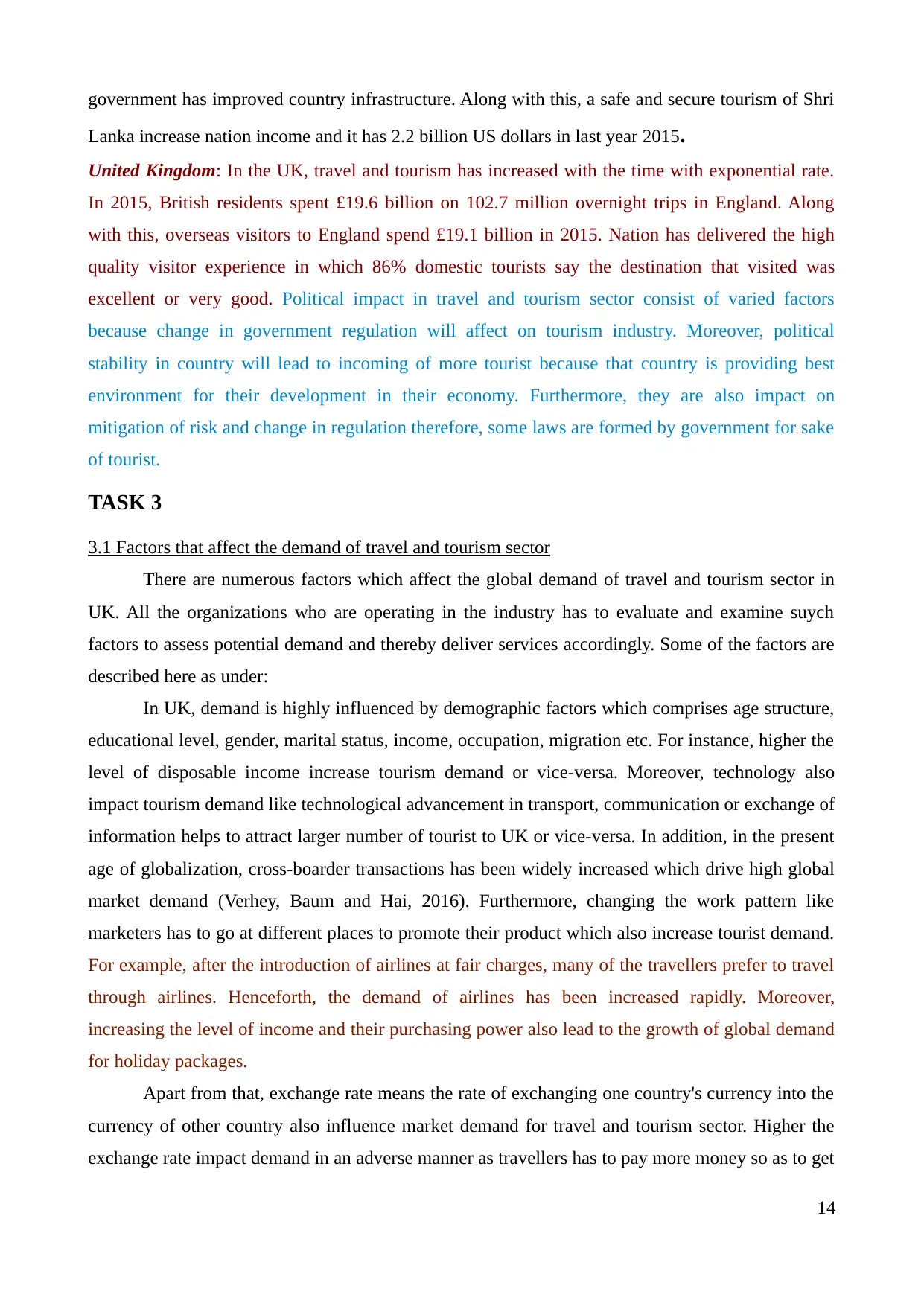
government has improved country infrastructure. Along with this, a safe and secure tourism of Shri
Lanka increase nation income and it has 2.2 billion US dollars in last year 2015.
United Kingdom: In the UK, travel and tourism has increased with the time with exponential rate.
In 2015, British residents spent £19.6 billion on 102.7 million overnight trips in England. Along
with this, overseas visitors to England spend £19.1 billion in 2015. Nation has delivered the high
quality visitor experience in which 86% domestic tourists say the destination that visited was
excellent or very good. Political impact in travel and tourism sector consist of varied factors
because change in government regulation will affect on tourism industry. Moreover, political
stability in country will lead to incoming of more tourist because that country is providing best
environment for their development in their economy. Furthermore, they are also impact on
mitigation of risk and change in regulation therefore, some laws are formed by government for sake
of tourist.
TASK 3
3.1 Factors that affect the demand of travel and tourism sector
There are numerous factors which affect the global demand of travel and tourism sector in
UK. All the organizations who are operating in the industry has to evaluate and examine suych
factors to assess potential demand and thereby deliver services accordingly. Some of the factors are
described here as under:
In UK, demand is highly influenced by demographic factors which comprises age structure,
educational level, gender, marital status, income, occupation, migration etc. For instance, higher the
level of disposable income increase tourism demand or vice-versa. Moreover, technology also
impact tourism demand like technological advancement in transport, communication or exchange of
information helps to attract larger number of tourist to UK or vice-versa. In addition, in the present
age of globalization, cross-boarder transactions has been widely increased which drive high global
market demand (Verhey, Baum and Hai, 2016). Furthermore, changing the work pattern like
marketers has to go at different places to promote their product which also increase tourist demand.
For example, after the introduction of airlines at fair charges, many of the travellers prefer to travel
through airlines. Henceforth, the demand of airlines has been increased rapidly. Moreover,
increasing the level of income and their purchasing power also lead to the growth of global demand
for holiday packages.
Apart from that, exchange rate means the rate of exchanging one country's currency into the
currency of other country also influence market demand for travel and tourism sector. Higher the
exchange rate impact demand in an adverse manner as travellers has to pay more money so as to get
14
Lanka increase nation income and it has 2.2 billion US dollars in last year 2015.
United Kingdom: In the UK, travel and tourism has increased with the time with exponential rate.
In 2015, British residents spent £19.6 billion on 102.7 million overnight trips in England. Along
with this, overseas visitors to England spend £19.1 billion in 2015. Nation has delivered the high
quality visitor experience in which 86% domestic tourists say the destination that visited was
excellent or very good. Political impact in travel and tourism sector consist of varied factors
because change in government regulation will affect on tourism industry. Moreover, political
stability in country will lead to incoming of more tourist because that country is providing best
environment for their development in their economy. Furthermore, they are also impact on
mitigation of risk and change in regulation therefore, some laws are formed by government for sake
of tourist.
TASK 3
3.1 Factors that affect the demand of travel and tourism sector
There are numerous factors which affect the global demand of travel and tourism sector in
UK. All the organizations who are operating in the industry has to evaluate and examine suych
factors to assess potential demand and thereby deliver services accordingly. Some of the factors are
described here as under:
In UK, demand is highly influenced by demographic factors which comprises age structure,
educational level, gender, marital status, income, occupation, migration etc. For instance, higher the
level of disposable income increase tourism demand or vice-versa. Moreover, technology also
impact tourism demand like technological advancement in transport, communication or exchange of
information helps to attract larger number of tourist to UK or vice-versa. In addition, in the present
age of globalization, cross-boarder transactions has been widely increased which drive high global
market demand (Verhey, Baum and Hai, 2016). Furthermore, changing the work pattern like
marketers has to go at different places to promote their product which also increase tourist demand.
For example, after the introduction of airlines at fair charges, many of the travellers prefer to travel
through airlines. Henceforth, the demand of airlines has been increased rapidly. Moreover,
increasing the level of income and their purchasing power also lead to the growth of global demand
for holiday packages.
Apart from that, exchange rate means the rate of exchanging one country's currency into the
currency of other country also influence market demand for travel and tourism sector. Higher the
exchange rate impact demand in an adverse manner as travellers has to pay more money so as to get
14
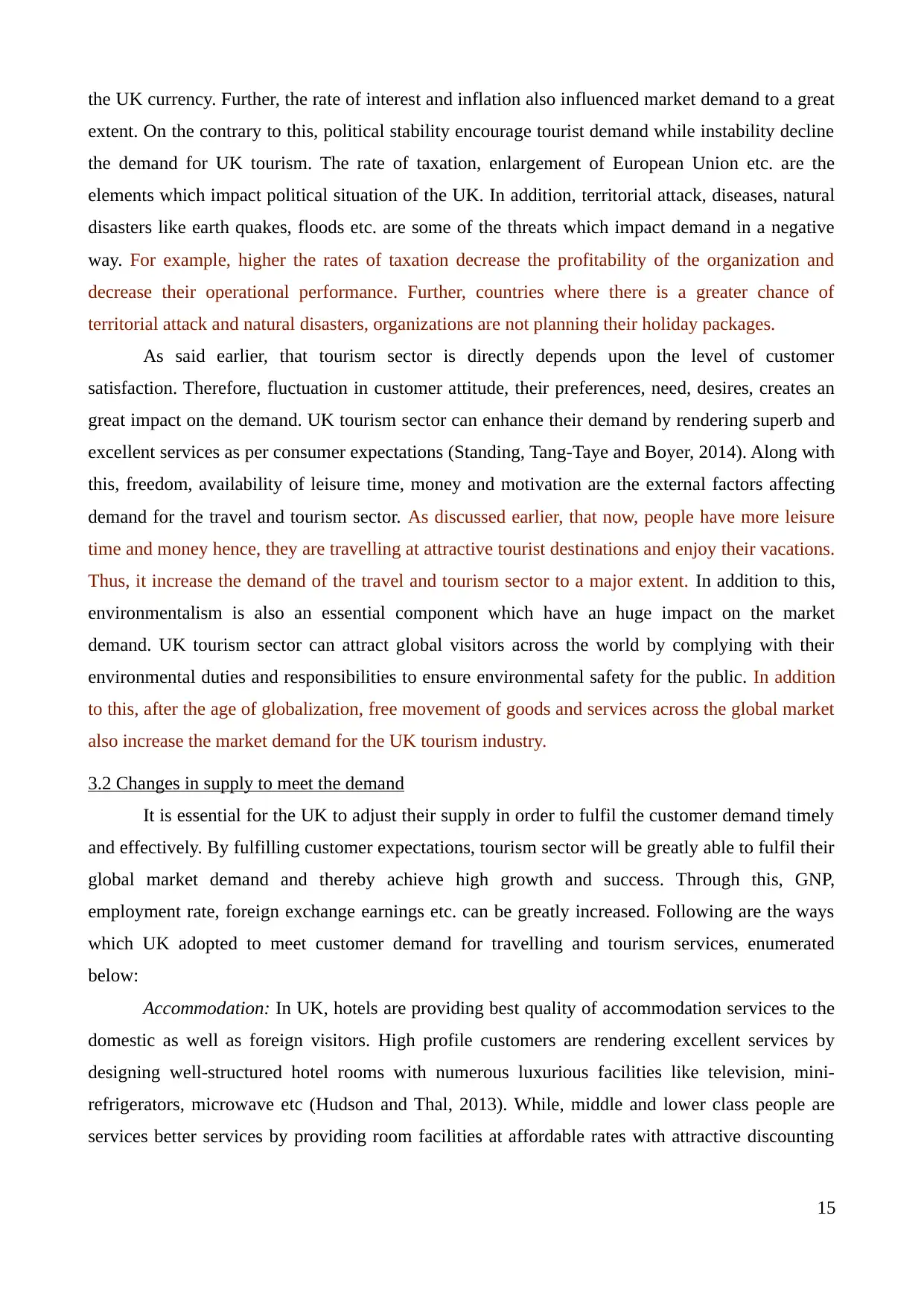
the UK currency. Further, the rate of interest and inflation also influenced market demand to a great
extent. On the contrary to this, political stability encourage tourist demand while instability decline
the demand for UK tourism. The rate of taxation, enlargement of European Union etc. are the
elements which impact political situation of the UK. In addition, territorial attack, diseases, natural
disasters like earth quakes, floods etc. are some of the threats which impact demand in a negative
way. For example, higher the rates of taxation decrease the profitability of the organization and
decrease their operational performance. Further, countries where there is a greater chance of
territorial attack and natural disasters, organizations are not planning their holiday packages.
As said earlier, that tourism sector is directly depends upon the level of customer
satisfaction. Therefore, fluctuation in customer attitude, their preferences, need, desires, creates an
great impact on the demand. UK tourism sector can enhance their demand by rendering superb and
excellent services as per consumer expectations (Standing, Tang-Taye and Boyer, 2014). Along with
this, freedom, availability of leisure time, money and motivation are the external factors affecting
demand for the travel and tourism sector. As discussed earlier, that now, people have more leisure
time and money hence, they are travelling at attractive tourist destinations and enjoy their vacations.
Thus, it increase the demand of the travel and tourism sector to a major extent. In addition to this,
environmentalism is also an essential component which have an huge impact on the market
demand. UK tourism sector can attract global visitors across the world by complying with their
environmental duties and responsibilities to ensure environmental safety for the public. In addition
to this, after the age of globalization, free movement of goods and services across the global market
also increase the market demand for the UK tourism industry.
3.2 Changes in supply to meet the demand
It is essential for the UK to adjust their supply in order to fulfil the customer demand timely
and effectively. By fulfilling customer expectations, tourism sector will be greatly able to fulfil their
global market demand and thereby achieve high growth and success. Through this, GNP,
employment rate, foreign exchange earnings etc. can be greatly increased. Following are the ways
which UK adopted to meet customer demand for travelling and tourism services, enumerated
below:
Accommodation: In UK, hotels are providing best quality of accommodation services to the
domestic as well as foreign visitors. High profile customers are rendering excellent services by
designing well-structured hotel rooms with numerous luxurious facilities like television, mini-
refrigerators, microwave etc (Hudson and Thal, 2013). While, middle and lower class people are
services better services by providing room facilities at affordable rates with attractive discounting
15
extent. On the contrary to this, political stability encourage tourist demand while instability decline
the demand for UK tourism. The rate of taxation, enlargement of European Union etc. are the
elements which impact political situation of the UK. In addition, territorial attack, diseases, natural
disasters like earth quakes, floods etc. are some of the threats which impact demand in a negative
way. For example, higher the rates of taxation decrease the profitability of the organization and
decrease their operational performance. Further, countries where there is a greater chance of
territorial attack and natural disasters, organizations are not planning their holiday packages.
As said earlier, that tourism sector is directly depends upon the level of customer
satisfaction. Therefore, fluctuation in customer attitude, their preferences, need, desires, creates an
great impact on the demand. UK tourism sector can enhance their demand by rendering superb and
excellent services as per consumer expectations (Standing, Tang-Taye and Boyer, 2014). Along with
this, freedom, availability of leisure time, money and motivation are the external factors affecting
demand for the travel and tourism sector. As discussed earlier, that now, people have more leisure
time and money hence, they are travelling at attractive tourist destinations and enjoy their vacations.
Thus, it increase the demand of the travel and tourism sector to a major extent. In addition to this,
environmentalism is also an essential component which have an huge impact on the market
demand. UK tourism sector can attract global visitors across the world by complying with their
environmental duties and responsibilities to ensure environmental safety for the public. In addition
to this, after the age of globalization, free movement of goods and services across the global market
also increase the market demand for the UK tourism industry.
3.2 Changes in supply to meet the demand
It is essential for the UK to adjust their supply in order to fulfil the customer demand timely
and effectively. By fulfilling customer expectations, tourism sector will be greatly able to fulfil their
global market demand and thereby achieve high growth and success. Through this, GNP,
employment rate, foreign exchange earnings etc. can be greatly increased. Following are the ways
which UK adopted to meet customer demand for travelling and tourism services, enumerated
below:
Accommodation: In UK, hotels are providing best quality of accommodation services to the
domestic as well as foreign visitors. High profile customers are rendering excellent services by
designing well-structured hotel rooms with numerous luxurious facilities like television, mini-
refrigerators, microwave etc (Hudson and Thal, 2013). While, middle and lower class people are
services better services by providing room facilities at affordable rates with attractive discounting
15
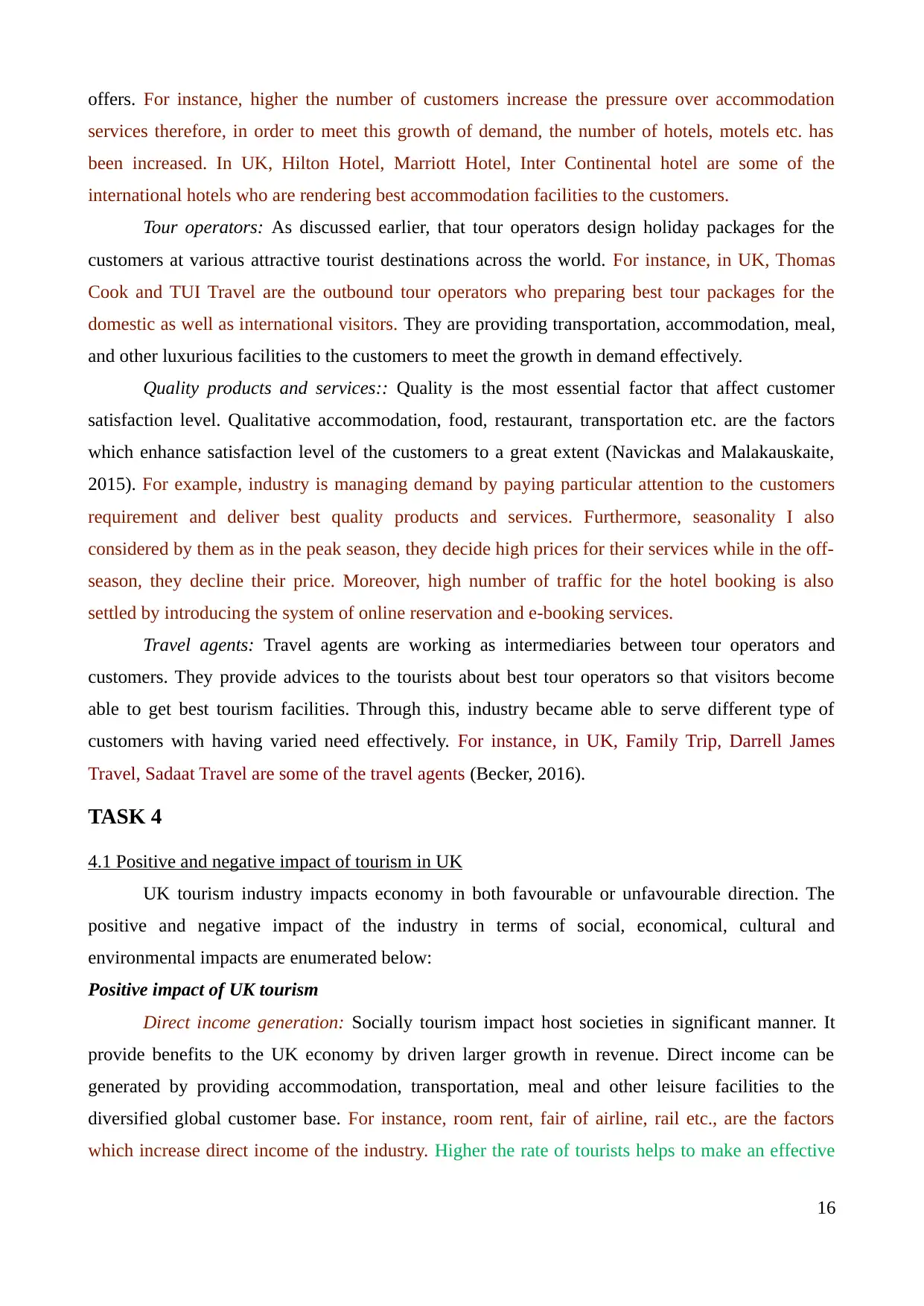
offers. For instance, higher the number of customers increase the pressure over accommodation
services therefore, in order to meet this growth of demand, the number of hotels, motels etc. has
been increased. In UK, Hilton Hotel, Marriott Hotel, Inter Continental hotel are some of the
international hotels who are rendering best accommodation facilities to the customers.
Tour operators: As discussed earlier, that tour operators design holiday packages for the
customers at various attractive tourist destinations across the world. For instance, in UK, Thomas
Cook and TUI Travel are the outbound tour operators who preparing best tour packages for the
domestic as well as international visitors. They are providing transportation, accommodation, meal,
and other luxurious facilities to the customers to meet the growth in demand effectively.
Quality products and services:: Quality is the most essential factor that affect customer
satisfaction level. Qualitative accommodation, food, restaurant, transportation etc. are the factors
which enhance satisfaction level of the customers to a great extent (Navickas and Malakauskaite,
2015). For example, industry is managing demand by paying particular attention to the customers
requirement and deliver best quality products and services. Furthermore, seasonality I also
considered by them as in the peak season, they decide high prices for their services while in the off-
season, they decline their price. Moreover, high number of traffic for the hotel booking is also
settled by introducing the system of online reservation and e-booking services.
Travel agents: Travel agents are working as intermediaries between tour operators and
customers. They provide advices to the tourists about best tour operators so that visitors become
able to get best tourism facilities. Through this, industry became able to serve different type of
customers with having varied need effectively. For instance, in UK, Family Trip, Darrell James
Travel, Sadaat Travel are some of the travel agents (Becker, 2016).
TASK 4
4.1 Positive and negative impact of tourism in UK
UK tourism industry impacts economy in both favourable or unfavourable direction. The
positive and negative impact of the industry in terms of social, economical, cultural and
environmental impacts are enumerated below:
Positive impact of UK tourism
Direct income generation: Socially tourism impact host societies in significant manner. It
provide benefits to the UK economy by driven larger growth in revenue. Direct income can be
generated by providing accommodation, transportation, meal and other leisure facilities to the
diversified global customer base. For instance, room rent, fair of airline, rail etc., are the factors
which increase direct income of the industry. Higher the rate of tourists helps to make an effective
16
services therefore, in order to meet this growth of demand, the number of hotels, motels etc. has
been increased. In UK, Hilton Hotel, Marriott Hotel, Inter Continental hotel are some of the
international hotels who are rendering best accommodation facilities to the customers.
Tour operators: As discussed earlier, that tour operators design holiday packages for the
customers at various attractive tourist destinations across the world. For instance, in UK, Thomas
Cook and TUI Travel are the outbound tour operators who preparing best tour packages for the
domestic as well as international visitors. They are providing transportation, accommodation, meal,
and other luxurious facilities to the customers to meet the growth in demand effectively.
Quality products and services:: Quality is the most essential factor that affect customer
satisfaction level. Qualitative accommodation, food, restaurant, transportation etc. are the factors
which enhance satisfaction level of the customers to a great extent (Navickas and Malakauskaite,
2015). For example, industry is managing demand by paying particular attention to the customers
requirement and deliver best quality products and services. Furthermore, seasonality I also
considered by them as in the peak season, they decide high prices for their services while in the off-
season, they decline their price. Moreover, high number of traffic for the hotel booking is also
settled by introducing the system of online reservation and e-booking services.
Travel agents: Travel agents are working as intermediaries between tour operators and
customers. They provide advices to the tourists about best tour operators so that visitors become
able to get best tourism facilities. Through this, industry became able to serve different type of
customers with having varied need effectively. For instance, in UK, Family Trip, Darrell James
Travel, Sadaat Travel are some of the travel agents (Becker, 2016).
TASK 4
4.1 Positive and negative impact of tourism in UK
UK tourism industry impacts economy in both favourable or unfavourable direction. The
positive and negative impact of the industry in terms of social, economical, cultural and
environmental impacts are enumerated below:
Positive impact of UK tourism
Direct income generation: Socially tourism impact host societies in significant manner. It
provide benefits to the UK economy by driven larger growth in revenue. Direct income can be
generated by providing accommodation, transportation, meal and other leisure facilities to the
diversified global customer base. For instance, room rent, fair of airline, rail etc., are the factors
which increase direct income of the industry. Higher the rate of tourists helps to make an effective
16
Secure Best Marks with AI Grader
Need help grading? Try our AI Grader for instant feedback on your assignments.
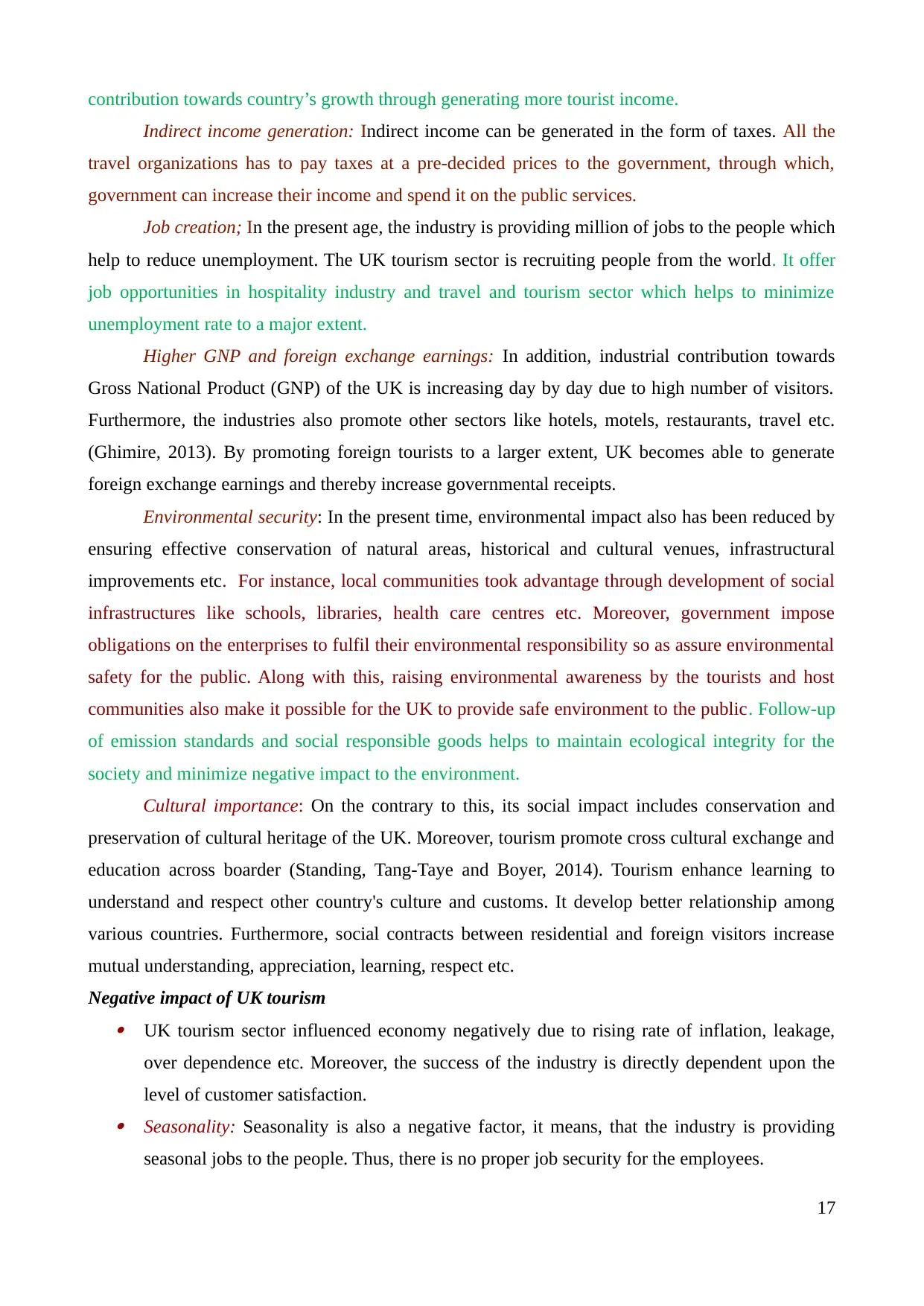
contribution towards country’s growth through generating more tourist income.
Indirect income generation: Indirect income can be generated in the form of taxes. All the
travel organizations has to pay taxes at a pre-decided prices to the government, through which,
government can increase their income and spend it on the public services.
Job creation; In the present age, the industry is providing million of jobs to the people which
help to reduce unemployment. The UK tourism sector is recruiting people from the world. It offer
job opportunities in hospitality industry and travel and tourism sector which helps to minimize
unemployment rate to a major extent.
Higher GNP and foreign exchange earnings: In addition, industrial contribution towards
Gross National Product (GNP) of the UK is increasing day by day due to high number of visitors.
Furthermore, the industries also promote other sectors like hotels, motels, restaurants, travel etc.
(Ghimire, 2013). By promoting foreign tourists to a larger extent, UK becomes able to generate
foreign exchange earnings and thereby increase governmental receipts.
Environmental security: In the present time, environmental impact also has been reduced by
ensuring effective conservation of natural areas, historical and cultural venues, infrastructural
improvements etc. For instance, local communities took advantage through development of social
infrastructures like schools, libraries, health care centres etc. Moreover, government impose
obligations on the enterprises to fulfil their environmental responsibility so as assure environmental
safety for the public. Along with this, raising environmental awareness by the tourists and host
communities also make it possible for the UK to provide safe environment to the public. Follow-up
of emission standards and social responsible goods helps to maintain ecological integrity for the
society and minimize negative impact to the environment.
Cultural importance: On the contrary to this, its social impact includes conservation and
preservation of cultural heritage of the UK. Moreover, tourism promote cross cultural exchange and
education across boarder (Standing, Tang-Taye and Boyer, 2014). Tourism enhance learning to
understand and respect other country's culture and customs. It develop better relationship among
various countries. Furthermore, social contracts between residential and foreign visitors increase
mutual understanding, appreciation, learning, respect etc.
Negative impact of UK tourism UK tourism sector influenced economy negatively due to rising rate of inflation, leakage,
over dependence etc. Moreover, the success of the industry is directly dependent upon the
level of customer satisfaction. Seasonality: Seasonality is also a negative factor, it means, that the industry is providing
seasonal jobs to the people. Thus, there is no proper job security for the employees.
17
Indirect income generation: Indirect income can be generated in the form of taxes. All the
travel organizations has to pay taxes at a pre-decided prices to the government, through which,
government can increase their income and spend it on the public services.
Job creation; In the present age, the industry is providing million of jobs to the people which
help to reduce unemployment. The UK tourism sector is recruiting people from the world. It offer
job opportunities in hospitality industry and travel and tourism sector which helps to minimize
unemployment rate to a major extent.
Higher GNP and foreign exchange earnings: In addition, industrial contribution towards
Gross National Product (GNP) of the UK is increasing day by day due to high number of visitors.
Furthermore, the industries also promote other sectors like hotels, motels, restaurants, travel etc.
(Ghimire, 2013). By promoting foreign tourists to a larger extent, UK becomes able to generate
foreign exchange earnings and thereby increase governmental receipts.
Environmental security: In the present time, environmental impact also has been reduced by
ensuring effective conservation of natural areas, historical and cultural venues, infrastructural
improvements etc. For instance, local communities took advantage through development of social
infrastructures like schools, libraries, health care centres etc. Moreover, government impose
obligations on the enterprises to fulfil their environmental responsibility so as assure environmental
safety for the public. Along with this, raising environmental awareness by the tourists and host
communities also make it possible for the UK to provide safe environment to the public. Follow-up
of emission standards and social responsible goods helps to maintain ecological integrity for the
society and minimize negative impact to the environment.
Cultural importance: On the contrary to this, its social impact includes conservation and
preservation of cultural heritage of the UK. Moreover, tourism promote cross cultural exchange and
education across boarder (Standing, Tang-Taye and Boyer, 2014). Tourism enhance learning to
understand and respect other country's culture and customs. It develop better relationship among
various countries. Furthermore, social contracts between residential and foreign visitors increase
mutual understanding, appreciation, learning, respect etc.
Negative impact of UK tourism UK tourism sector influenced economy negatively due to rising rate of inflation, leakage,
over dependence etc. Moreover, the success of the industry is directly dependent upon the
level of customer satisfaction. Seasonality: Seasonality is also a negative factor, it means, that the industry is providing
seasonal jobs to the people. Thus, there is no proper job security for the employees.
17
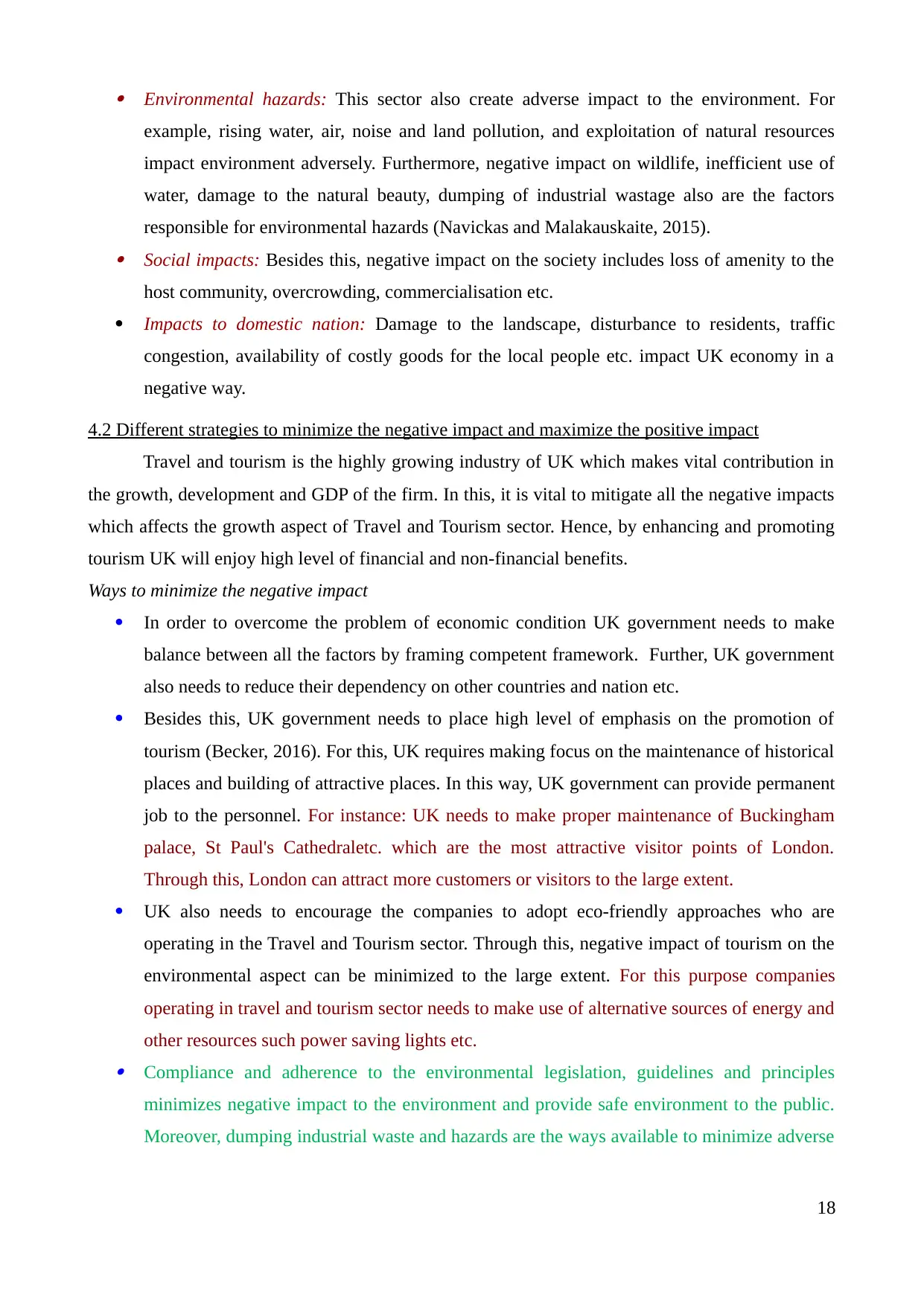
Environmental hazards: This sector also create adverse impact to the environment. For
example, rising water, air, noise and land pollution, and exploitation of natural resources
impact environment adversely. Furthermore, negative impact on wildlife, inefficient use of
water, damage to the natural beauty, dumping of industrial wastage also are the factors
responsible for environmental hazards (Navickas and Malakauskaite, 2015). Social impacts: Besides this, negative impact on the society includes loss of amenity to the
host community, overcrowding, commercialisation etc.
Impacts to domestic nation: Damage to the landscape, disturbance to residents, traffic
congestion, availability of costly goods for the local people etc. impact UK economy in a
negative way.
4.2 Different strategies to minimize the negative impact and maximize the positive impact
Travel and tourism is the highly growing industry of UK which makes vital contribution in
the growth, development and GDP of the firm. In this, it is vital to mitigate all the negative impacts
which affects the growth aspect of Travel and Tourism sector. Hence, by enhancing and promoting
tourism UK will enjoy high level of financial and non-financial benefits.
Ways to minimize the negative impact
In order to overcome the problem of economic condition UK government needs to make
balance between all the factors by framing competent framework. Further, UK government
also needs to reduce their dependency on other countries and nation etc.
Besides this, UK government needs to place high level of emphasis on the promotion of
tourism (Becker, 2016). For this, UK requires making focus on the maintenance of historical
places and building of attractive places. In this way, UK government can provide permanent
job to the personnel. For instance: UK needs to make proper maintenance of Buckingham
palace, St Paul's Cathedraletc. which are the most attractive visitor points of London.
Through this, London can attract more customers or visitors to the large extent.
UK also needs to encourage the companies to adopt eco-friendly approaches who are
operating in the Travel and Tourism sector. Through this, negative impact of tourism on the
environmental aspect can be minimized to the large extent. For this purpose companies
operating in travel and tourism sector needs to make use of alternative sources of energy and
other resources such power saving lights etc. Compliance and adherence to the environmental legislation, guidelines and principles
minimizes negative impact to the environment and provide safe environment to the public.
Moreover, dumping industrial waste and hazards are the ways available to minimize adverse
18
example, rising water, air, noise and land pollution, and exploitation of natural resources
impact environment adversely. Furthermore, negative impact on wildlife, inefficient use of
water, damage to the natural beauty, dumping of industrial wastage also are the factors
responsible for environmental hazards (Navickas and Malakauskaite, 2015). Social impacts: Besides this, negative impact on the society includes loss of amenity to the
host community, overcrowding, commercialisation etc.
Impacts to domestic nation: Damage to the landscape, disturbance to residents, traffic
congestion, availability of costly goods for the local people etc. impact UK economy in a
negative way.
4.2 Different strategies to minimize the negative impact and maximize the positive impact
Travel and tourism is the highly growing industry of UK which makes vital contribution in
the growth, development and GDP of the firm. In this, it is vital to mitigate all the negative impacts
which affects the growth aspect of Travel and Tourism sector. Hence, by enhancing and promoting
tourism UK will enjoy high level of financial and non-financial benefits.
Ways to minimize the negative impact
In order to overcome the problem of economic condition UK government needs to make
balance between all the factors by framing competent framework. Further, UK government
also needs to reduce their dependency on other countries and nation etc.
Besides this, UK government needs to place high level of emphasis on the promotion of
tourism (Becker, 2016). For this, UK requires making focus on the maintenance of historical
places and building of attractive places. In this way, UK government can provide permanent
job to the personnel. For instance: UK needs to make proper maintenance of Buckingham
palace, St Paul's Cathedraletc. which are the most attractive visitor points of London.
Through this, London can attract more customers or visitors to the large extent.
UK also needs to encourage the companies to adopt eco-friendly approaches who are
operating in the Travel and Tourism sector. Through this, negative impact of tourism on the
environmental aspect can be minimized to the large extent. For this purpose companies
operating in travel and tourism sector needs to make use of alternative sources of energy and
other resources such power saving lights etc. Compliance and adherence to the environmental legislation, guidelines and principles
minimizes negative impact to the environment and provide safe environment to the public.
Moreover, dumping industrial waste and hazards are the ways available to minimize adverse
18
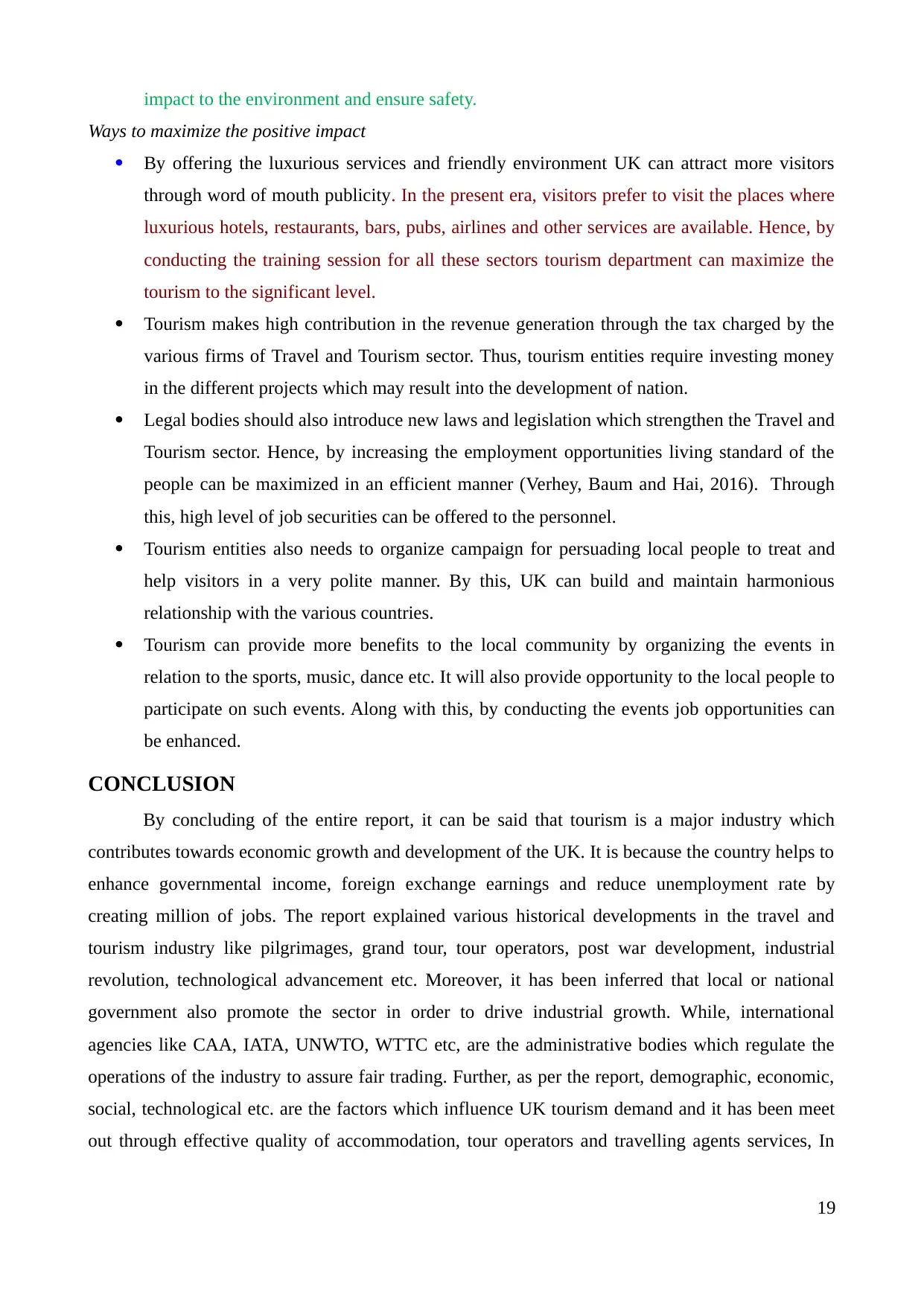
impact to the environment and ensure safety.
Ways to maximize the positive impact
By offering the luxurious services and friendly environment UK can attract more visitors
through word of mouth publicity. In the present era, visitors prefer to visit the places where
luxurious hotels, restaurants, bars, pubs, airlines and other services are available. Hence, by
conducting the training session for all these sectors tourism department can maximize the
tourism to the significant level.
Tourism makes high contribution in the revenue generation through the tax charged by the
various firms of Travel and Tourism sector. Thus, tourism entities require investing money
in the different projects which may result into the development of nation.
Legal bodies should also introduce new laws and legislation which strengthen the Travel and
Tourism sector. Hence, by increasing the employment opportunities living standard of the
people can be maximized in an efficient manner (Verhey, Baum and Hai, 2016). Through
this, high level of job securities can be offered to the personnel.
Tourism entities also needs to organize campaign for persuading local people to treat and
help visitors in a very polite manner. By this, UK can build and maintain harmonious
relationship with the various countries.
Tourism can provide more benefits to the local community by organizing the events in
relation to the sports, music, dance etc. It will also provide opportunity to the local people to
participate on such events. Along with this, by conducting the events job opportunities can
be enhanced.
CONCLUSION
By concluding of the entire report, it can be said that tourism is a major industry which
contributes towards economic growth and development of the UK. It is because the country helps to
enhance governmental income, foreign exchange earnings and reduce unemployment rate by
creating million of jobs. The report explained various historical developments in the travel and
tourism industry like pilgrimages, grand tour, tour operators, post war development, industrial
revolution, technological advancement etc. Moreover, it has been inferred that local or national
government also promote the sector in order to drive industrial growth. While, international
agencies like CAA, IATA, UNWTO, WTTC etc, are the administrative bodies which regulate the
operations of the industry to assure fair trading. Further, as per the report, demographic, economic,
social, technological etc. are the factors which influence UK tourism demand and it has been meet
out through effective quality of accommodation, tour operators and travelling agents services, In
19
Ways to maximize the positive impact
By offering the luxurious services and friendly environment UK can attract more visitors
through word of mouth publicity. In the present era, visitors prefer to visit the places where
luxurious hotels, restaurants, bars, pubs, airlines and other services are available. Hence, by
conducting the training session for all these sectors tourism department can maximize the
tourism to the significant level.
Tourism makes high contribution in the revenue generation through the tax charged by the
various firms of Travel and Tourism sector. Thus, tourism entities require investing money
in the different projects which may result into the development of nation.
Legal bodies should also introduce new laws and legislation which strengthen the Travel and
Tourism sector. Hence, by increasing the employment opportunities living standard of the
people can be maximized in an efficient manner (Verhey, Baum and Hai, 2016). Through
this, high level of job securities can be offered to the personnel.
Tourism entities also needs to organize campaign for persuading local people to treat and
help visitors in a very polite manner. By this, UK can build and maintain harmonious
relationship with the various countries.
Tourism can provide more benefits to the local community by organizing the events in
relation to the sports, music, dance etc. It will also provide opportunity to the local people to
participate on such events. Along with this, by conducting the events job opportunities can
be enhanced.
CONCLUSION
By concluding of the entire report, it can be said that tourism is a major industry which
contributes towards economic growth and development of the UK. It is because the country helps to
enhance governmental income, foreign exchange earnings and reduce unemployment rate by
creating million of jobs. The report explained various historical developments in the travel and
tourism industry like pilgrimages, grand tour, tour operators, post war development, industrial
revolution, technological advancement etc. Moreover, it has been inferred that local or national
government also promote the sector in order to drive industrial growth. While, international
agencies like CAA, IATA, UNWTO, WTTC etc, are the administrative bodies which regulate the
operations of the industry to assure fair trading. Further, as per the report, demographic, economic,
social, technological etc. are the factors which influence UK tourism demand and it has been meet
out through effective quality of accommodation, tour operators and travelling agents services, In
19
Paraphrase This Document
Need a fresh take? Get an instant paraphrase of this document with our AI Paraphraser
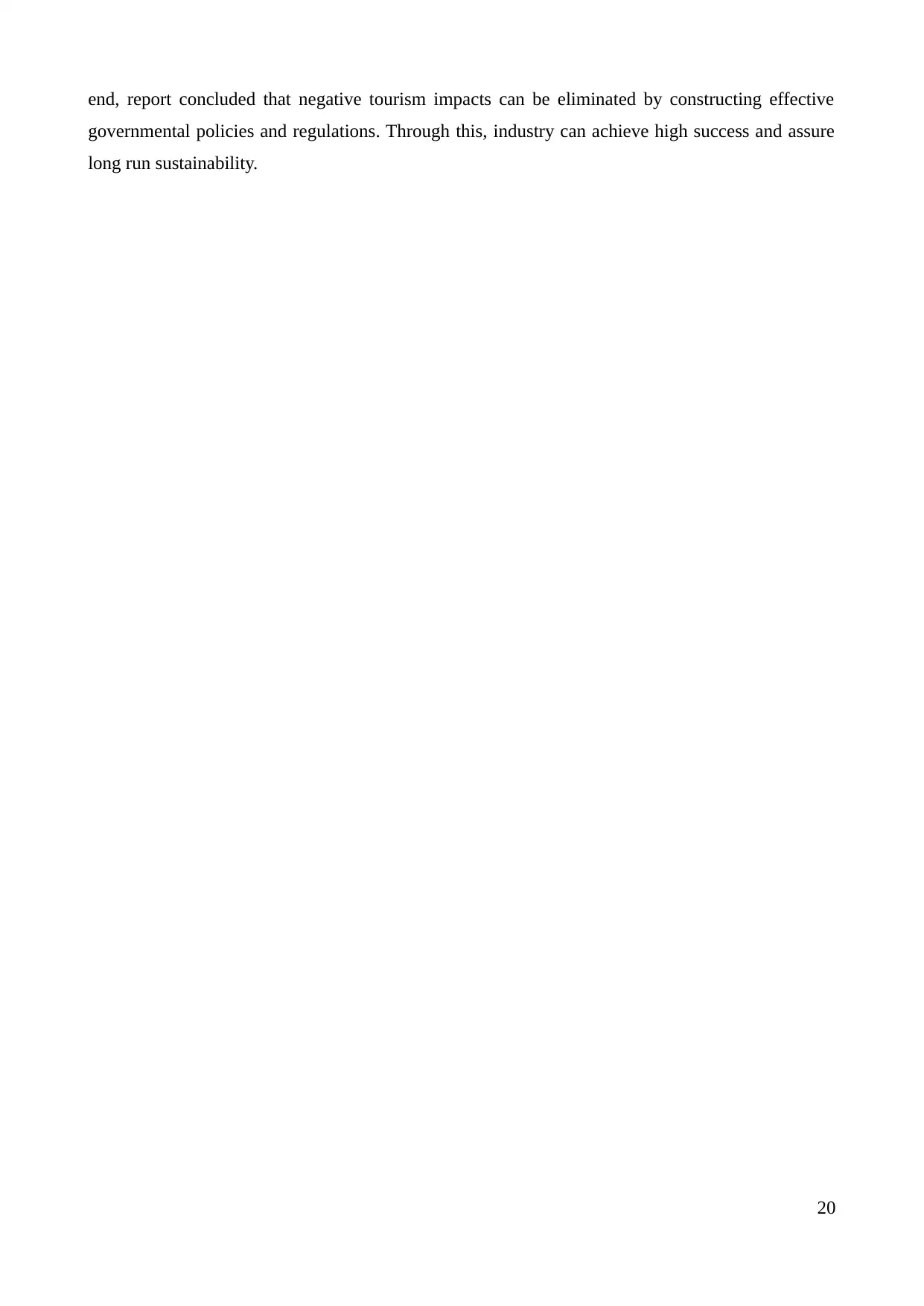
end, report concluded that negative tourism impacts can be eliminated by constructing effective
governmental policies and regulations. Through this, industry can achieve high success and assure
long run sustainability.
20
governmental policies and regulations. Through this, industry can achieve high success and assure
long run sustainability.
20
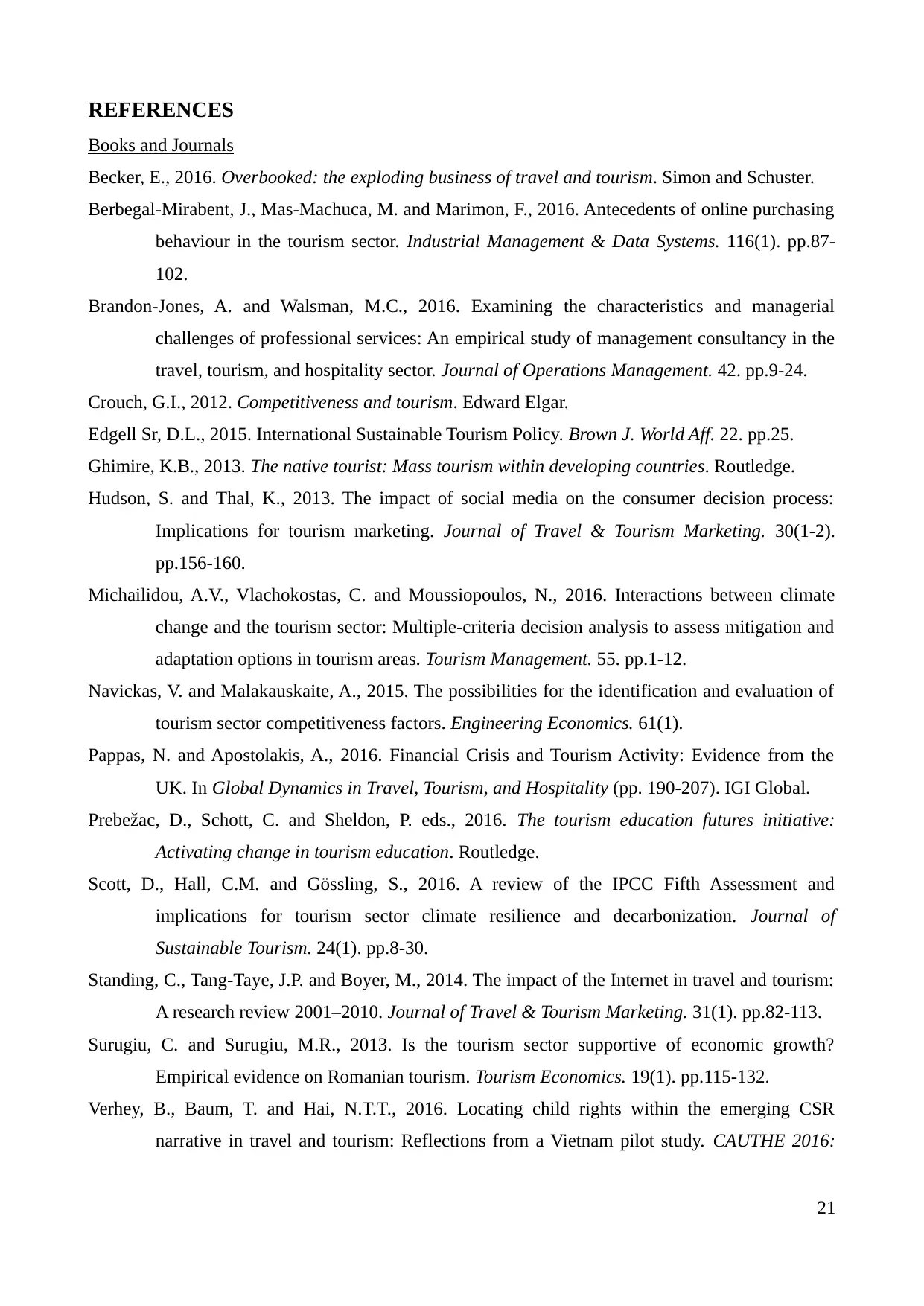
REFERENCES
Books and Journals
Becker, E., 2016. Overbooked: the exploding business of travel and tourism. Simon and Schuster.
Berbegal-Mirabent, J., Mas-Machuca, M. and Marimon, F., 2016. Antecedents of online purchasing
behaviour in the tourism sector. Industrial Management & Data Systems. 116(1). pp.87-
102.
Brandon-Jones, A. and Walsman, M.C., 2016. Examining the characteristics and managerial
challenges of professional services: An empirical study of management consultancy in the
travel, tourism, and hospitality sector. Journal of Operations Management. 42. pp.9-24.
Crouch, G.I., 2012. Competitiveness and tourism. Edward Elgar.
Edgell Sr, D.L., 2015. International Sustainable Tourism Policy. Brown J. World Aff. 22. pp.25.
Ghimire, K.B., 2013. The native tourist: Mass tourism within developing countries. Routledge.
Hudson, S. and Thal, K., 2013. The impact of social media on the consumer decision process:
Implications for tourism marketing. Journal of Travel & Tourism Marketing. 30(1-2).
pp.156-160.
Michailidou, A.V., Vlachokostas, C. and Moussiopoulos, Ν., 2016. Interactions between climate
change and the tourism sector: Multiple-criteria decision analysis to assess mitigation and
adaptation options in tourism areas. Tourism Management. 55. pp.1-12.
Navickas, V. and Malakauskaite, A., 2015. The possibilities for the identification and evaluation of
tourism sector competitiveness factors. Engineering Economics. 61(1).
Pappas, N. and Apostolakis, A., 2016. Financial Crisis and Tourism Activity: Evidence from the
UK. In Global Dynamics in Travel, Tourism, and Hospitality (pp. 190-207). IGI Global.
Prebežac, D., Schott, C. and Sheldon, P. eds., 2016. The tourism education futures initiative:
Activating change in tourism education. Routledge.
Scott, D., Hall, C.M. and Gössling, S., 2016. A review of the IPCC Fifth Assessment and
implications for tourism sector climate resilience and decarbonization. Journal of
Sustainable Tourism. 24(1). pp.8-30.
Standing, C., Tang-Taye, J.P. and Boyer, M., 2014. The impact of the Internet in travel and tourism:
A research review 2001–2010. Journal of Travel & Tourism Marketing. 31(1). pp.82-113.
Surugiu, C. and Surugiu, M.R., 2013. Is the tourism sector supportive of economic growth?
Empirical evidence on Romanian tourism. Tourism Economics. 19(1). pp.115-132.
Verhey, B., Baum, T. and Hai, N.T.T., 2016. Locating child rights within the emerging CSR
narrative in travel and tourism: Reflections from a Vietnam pilot study. CAUTHE 2016:
21
Books and Journals
Becker, E., 2016. Overbooked: the exploding business of travel and tourism. Simon and Schuster.
Berbegal-Mirabent, J., Mas-Machuca, M. and Marimon, F., 2016. Antecedents of online purchasing
behaviour in the tourism sector. Industrial Management & Data Systems. 116(1). pp.87-
102.
Brandon-Jones, A. and Walsman, M.C., 2016. Examining the characteristics and managerial
challenges of professional services: An empirical study of management consultancy in the
travel, tourism, and hospitality sector. Journal of Operations Management. 42. pp.9-24.
Crouch, G.I., 2012. Competitiveness and tourism. Edward Elgar.
Edgell Sr, D.L., 2015. International Sustainable Tourism Policy. Brown J. World Aff. 22. pp.25.
Ghimire, K.B., 2013. The native tourist: Mass tourism within developing countries. Routledge.
Hudson, S. and Thal, K., 2013. The impact of social media on the consumer decision process:
Implications for tourism marketing. Journal of Travel & Tourism Marketing. 30(1-2).
pp.156-160.
Michailidou, A.V., Vlachokostas, C. and Moussiopoulos, Ν., 2016. Interactions between climate
change and the tourism sector: Multiple-criteria decision analysis to assess mitigation and
adaptation options in tourism areas. Tourism Management. 55. pp.1-12.
Navickas, V. and Malakauskaite, A., 2015. The possibilities for the identification and evaluation of
tourism sector competitiveness factors. Engineering Economics. 61(1).
Pappas, N. and Apostolakis, A., 2016. Financial Crisis and Tourism Activity: Evidence from the
UK. In Global Dynamics in Travel, Tourism, and Hospitality (pp. 190-207). IGI Global.
Prebežac, D., Schott, C. and Sheldon, P. eds., 2016. The tourism education futures initiative:
Activating change in tourism education. Routledge.
Scott, D., Hall, C.M. and Gössling, S., 2016. A review of the IPCC Fifth Assessment and
implications for tourism sector climate resilience and decarbonization. Journal of
Sustainable Tourism. 24(1). pp.8-30.
Standing, C., Tang-Taye, J.P. and Boyer, M., 2014. The impact of the Internet in travel and tourism:
A research review 2001–2010. Journal of Travel & Tourism Marketing. 31(1). pp.82-113.
Surugiu, C. and Surugiu, M.R., 2013. Is the tourism sector supportive of economic growth?
Empirical evidence on Romanian tourism. Tourism Economics. 19(1). pp.115-132.
Verhey, B., Baum, T. and Hai, N.T.T., 2016. Locating child rights within the emerging CSR
narrative in travel and tourism: Reflections from a Vietnam pilot study. CAUTHE 2016:
21
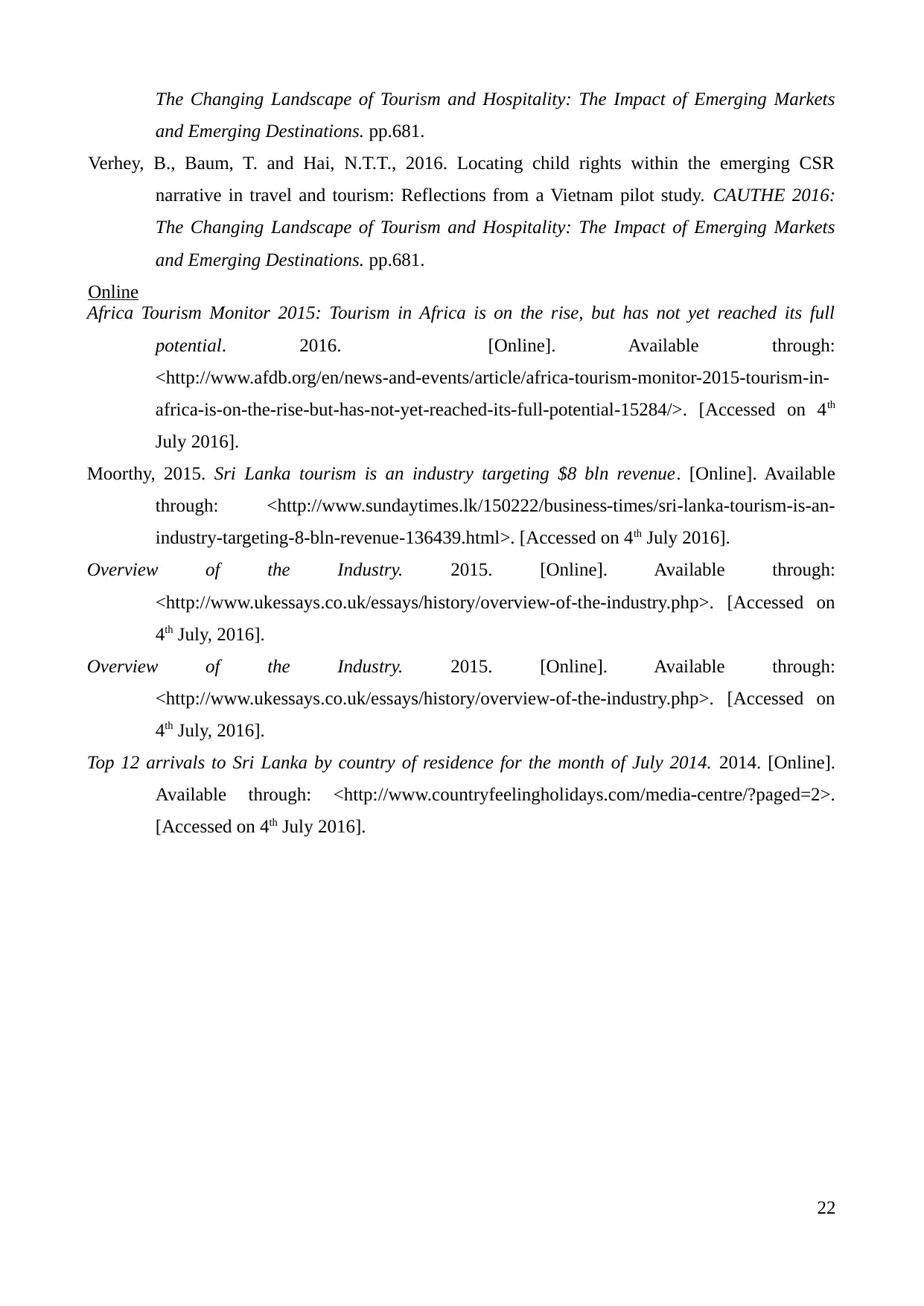
The Changing Landscape of Tourism and Hospitality: The Impact of Emerging Markets
and Emerging Destinations. pp.681.
Verhey, B., Baum, T. and Hai, N.T.T., 2016. Locating child rights within the emerging CSR
narrative in travel and tourism: Reflections from a Vietnam pilot study. CAUTHE 2016:
The Changing Landscape of Tourism and Hospitality: The Impact of Emerging Markets
and Emerging Destinations. pp.681.
Online
Africa Tourism Monitor 2015: Tourism in Africa is on the rise, but has not yet reached its full
potential. 2016. [Online]. Available through:
<http://www.afdb.org/en/news-and-events/article/africa-tourism-monitor-2015-tourism-in-
africa-is-on-the-rise-but-has-not-yet-reached-its-full-potential-15284/>. [Accessed on 4th
July 2016].
Moorthy, 2015. Sri Lanka tourism is an industry targeting $8 bln revenue. [Online]. Available
through: <http://www.sundaytimes.lk/150222/business-times/sri-lanka-tourism-is-an-
industry-targeting-8-bln-revenue-136439.html>. [Accessed on 4th July 2016].
Overview of the Industry. 2015. [Online]. Available through:
<http://www.ukessays.co.uk/essays/history/overview-of-the-industry.php>. [Accessed on
4th July, 2016].
Overview of the Industry. 2015. [Online]. Available through:
<http://www.ukessays.co.uk/essays/history/overview-of-the-industry.php>. [Accessed on
4th July, 2016].
Top 12 arrivals to Sri Lanka by country of residence for the month of July 2014. 2014. [Online].
Available through: <http://www.countryfeelingholidays.com/media-centre/?paged=2>.
[Accessed on 4th July 2016].
22
and Emerging Destinations. pp.681.
Verhey, B., Baum, T. and Hai, N.T.T., 2016. Locating child rights within the emerging CSR
narrative in travel and tourism: Reflections from a Vietnam pilot study. CAUTHE 2016:
The Changing Landscape of Tourism and Hospitality: The Impact of Emerging Markets
and Emerging Destinations. pp.681.
Online
Africa Tourism Monitor 2015: Tourism in Africa is on the rise, but has not yet reached its full
potential. 2016. [Online]. Available through:
<http://www.afdb.org/en/news-and-events/article/africa-tourism-monitor-2015-tourism-in-
africa-is-on-the-rise-but-has-not-yet-reached-its-full-potential-15284/>. [Accessed on 4th
July 2016].
Moorthy, 2015. Sri Lanka tourism is an industry targeting $8 bln revenue. [Online]. Available
through: <http://www.sundaytimes.lk/150222/business-times/sri-lanka-tourism-is-an-
industry-targeting-8-bln-revenue-136439.html>. [Accessed on 4th July 2016].
Overview of the Industry. 2015. [Online]. Available through:
<http://www.ukessays.co.uk/essays/history/overview-of-the-industry.php>. [Accessed on
4th July, 2016].
Overview of the Industry. 2015. [Online]. Available through:
<http://www.ukessays.co.uk/essays/history/overview-of-the-industry.php>. [Accessed on
4th July, 2016].
Top 12 arrivals to Sri Lanka by country of residence for the month of July 2014. 2014. [Online].
Available through: <http://www.countryfeelingholidays.com/media-centre/?paged=2>.
[Accessed on 4th July 2016].
22
1 out of 22
Related Documents
Your All-in-One AI-Powered Toolkit for Academic Success.
+13062052269
info@desklib.com
Available 24*7 on WhatsApp / Email
![[object Object]](/_next/static/media/star-bottom.7253800d.svg)
Unlock your academic potential
© 2024 | Zucol Services PVT LTD | All rights reserved.





